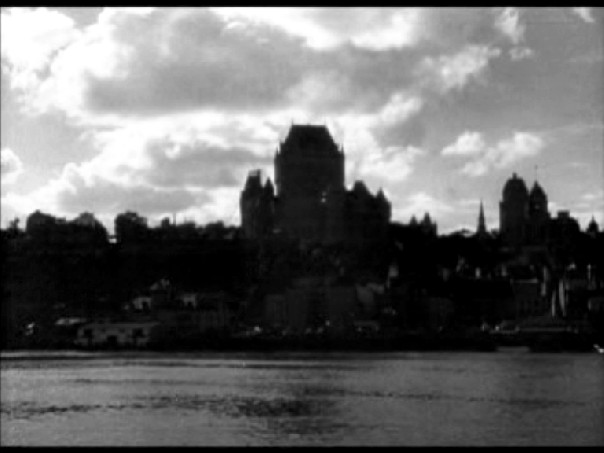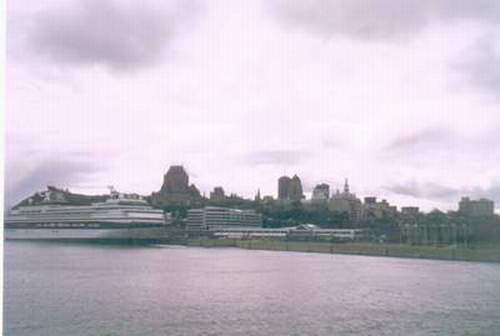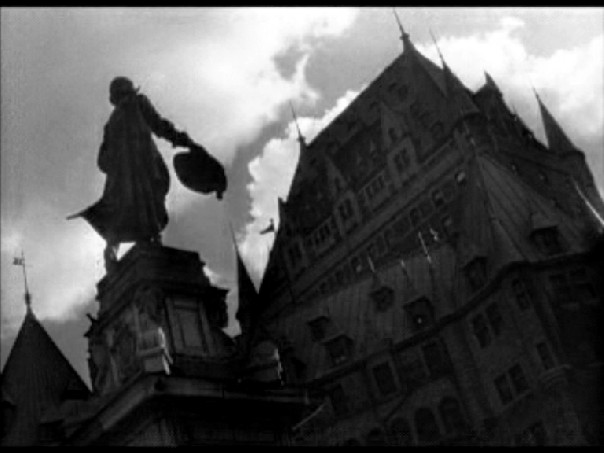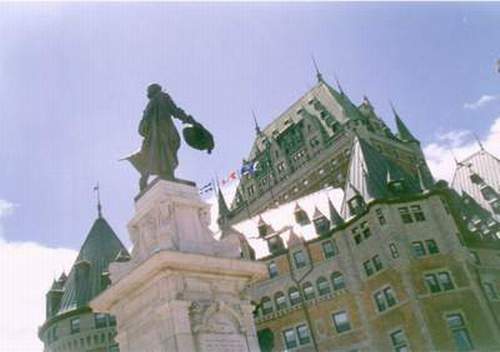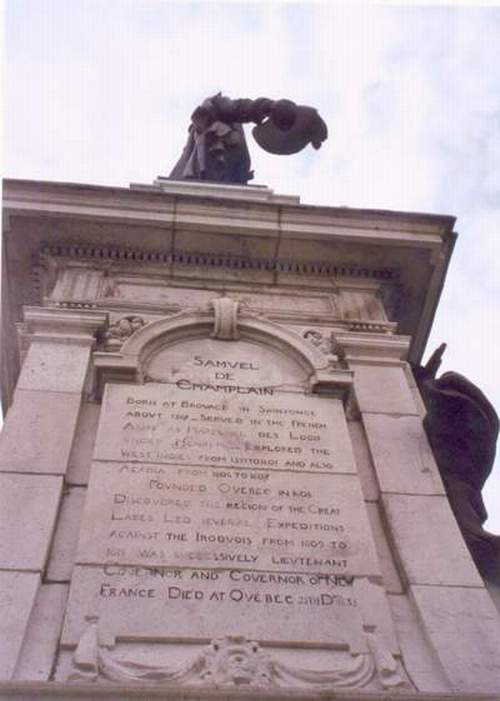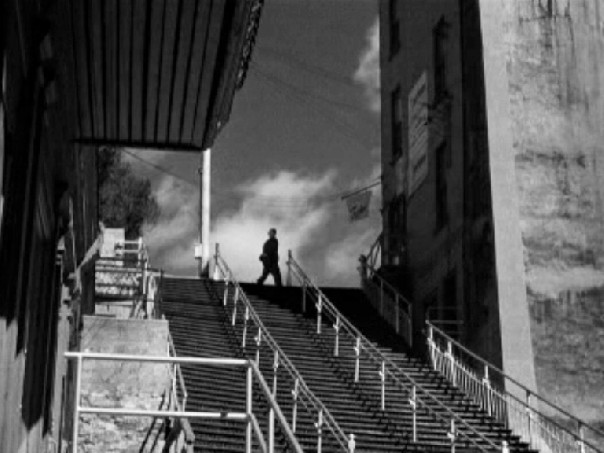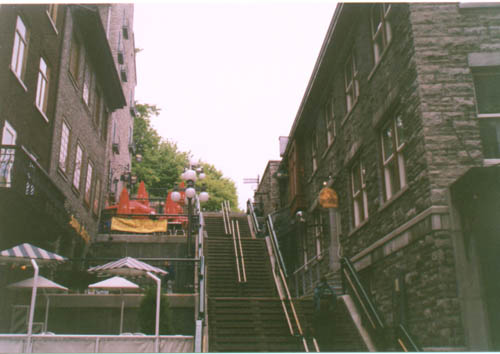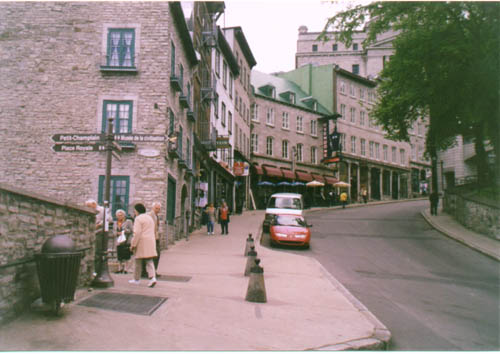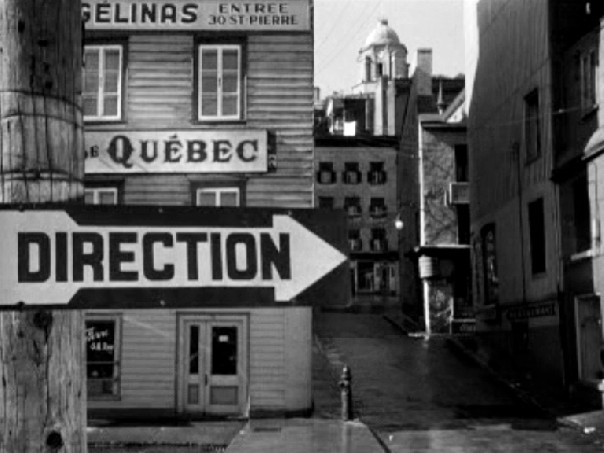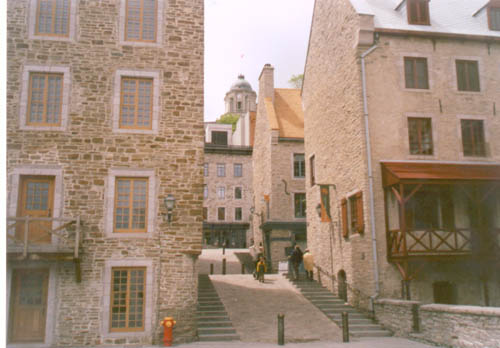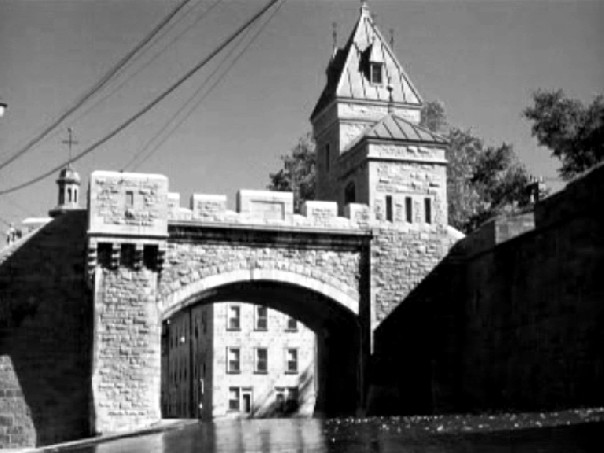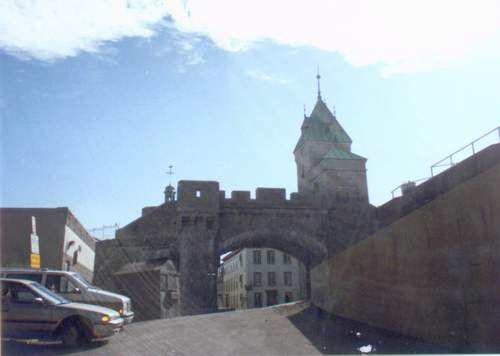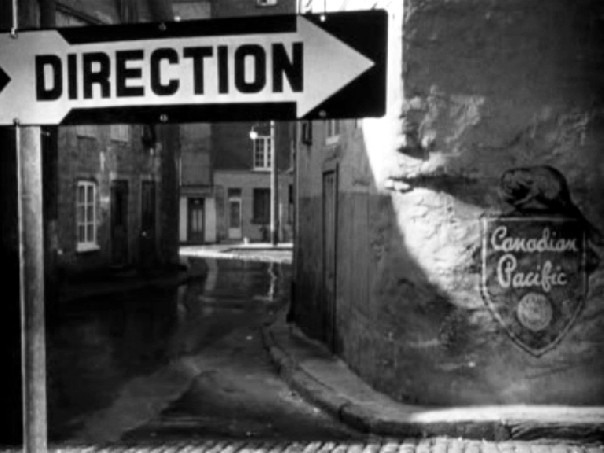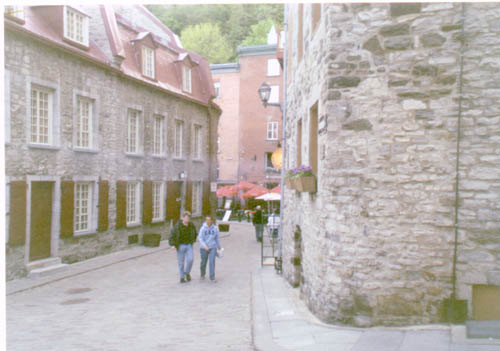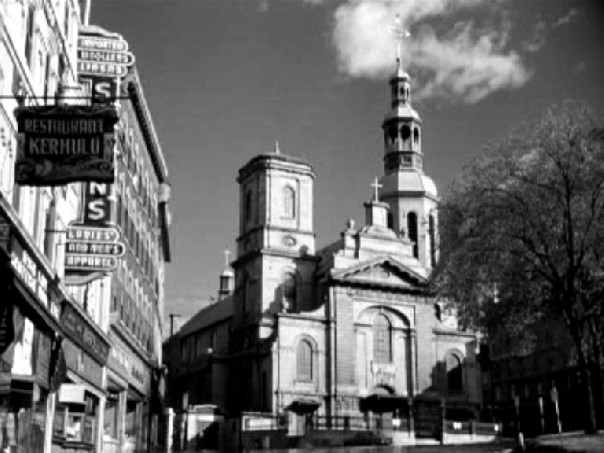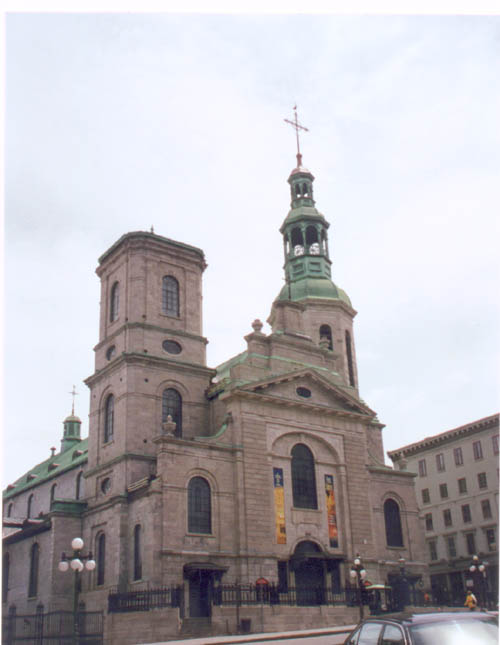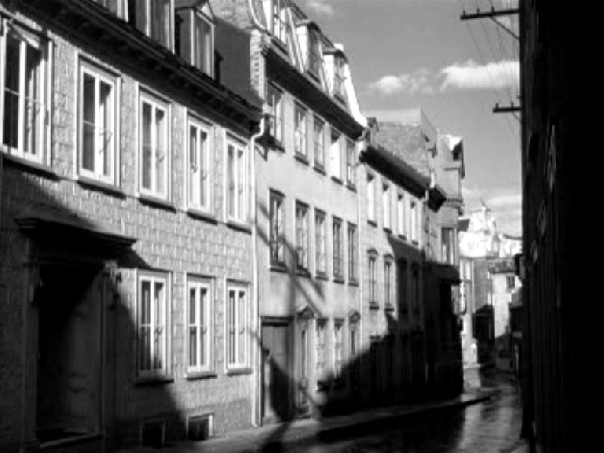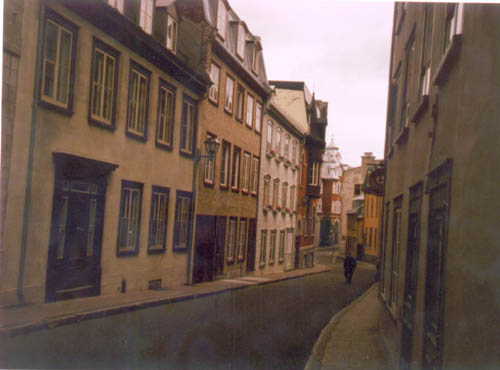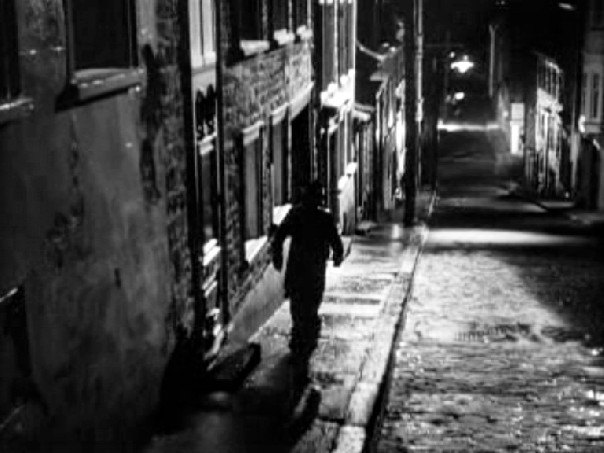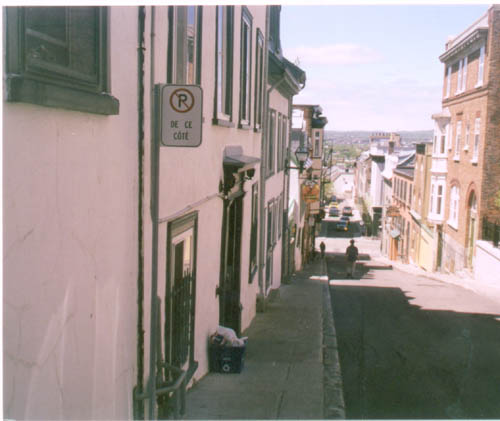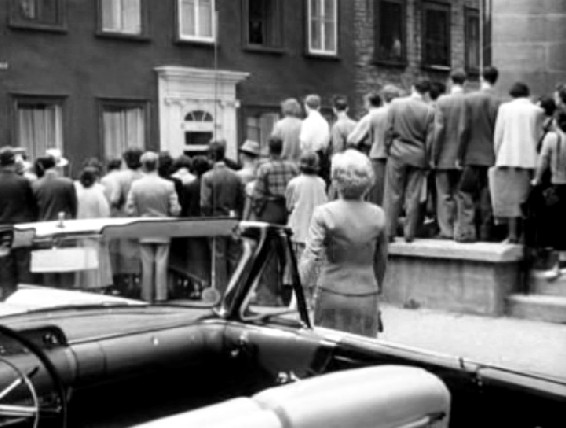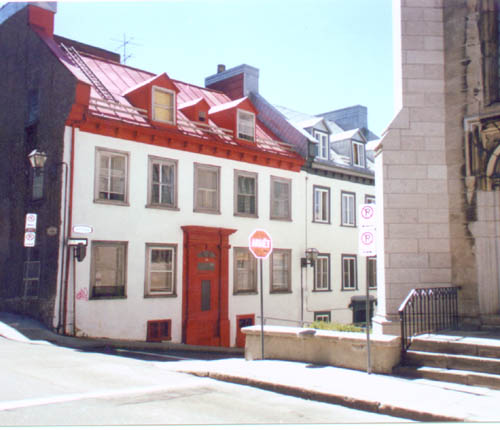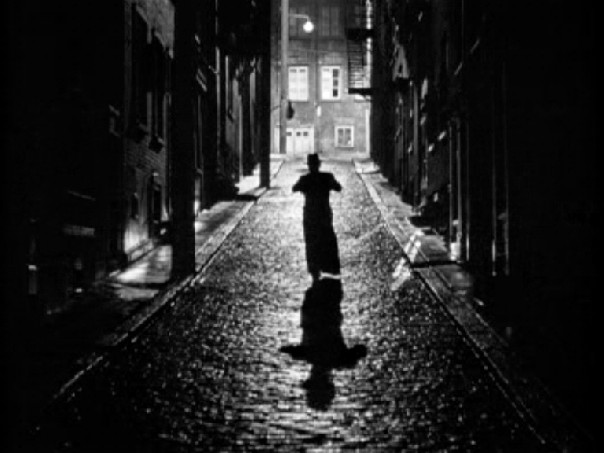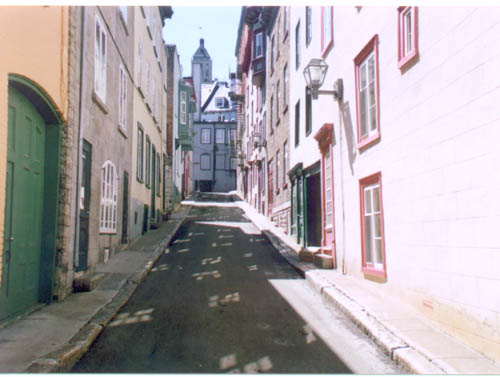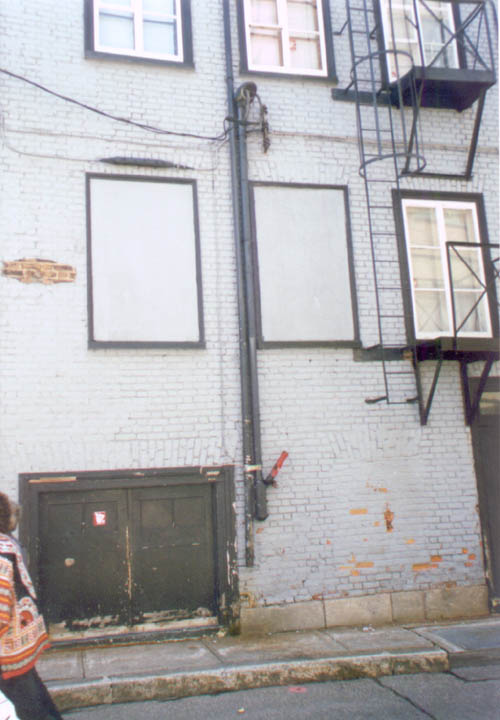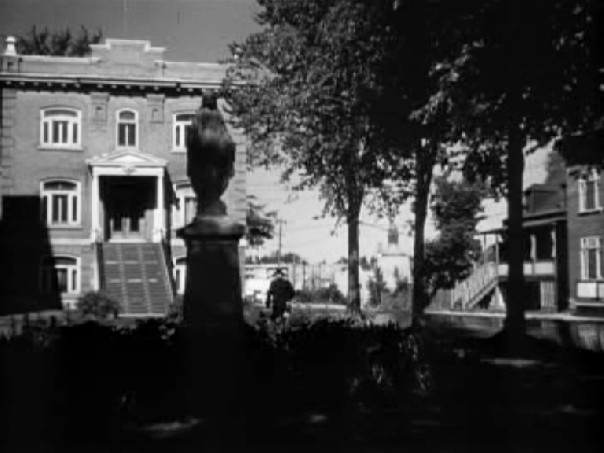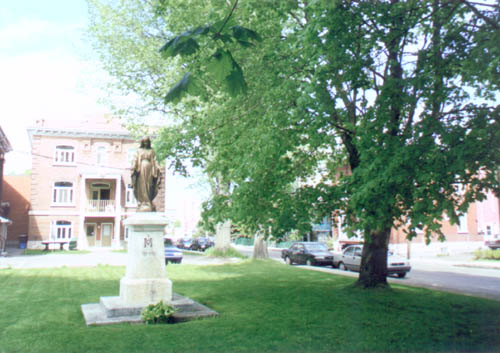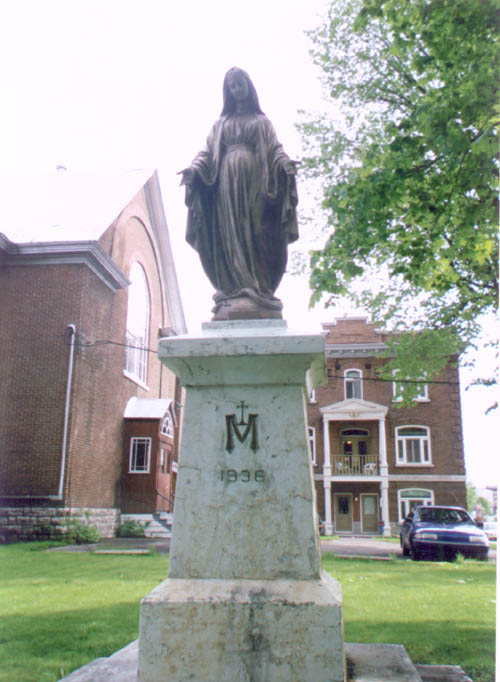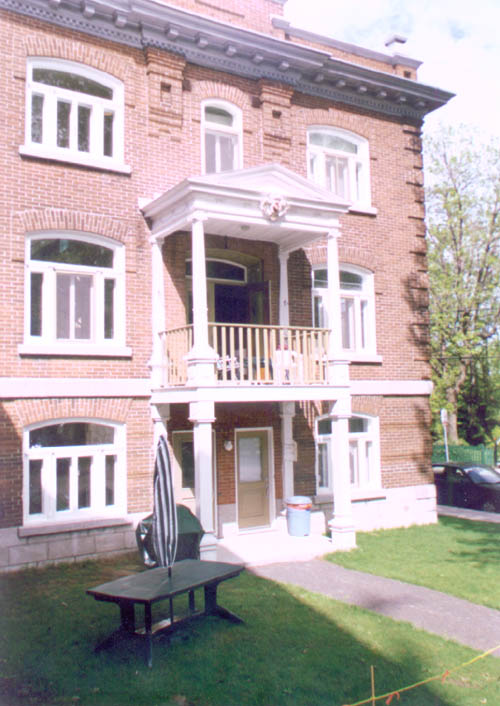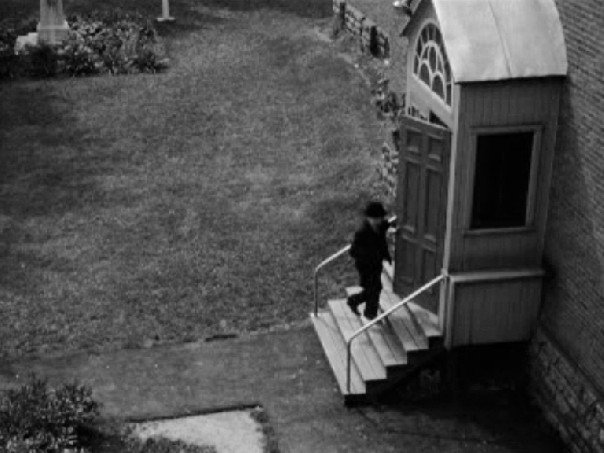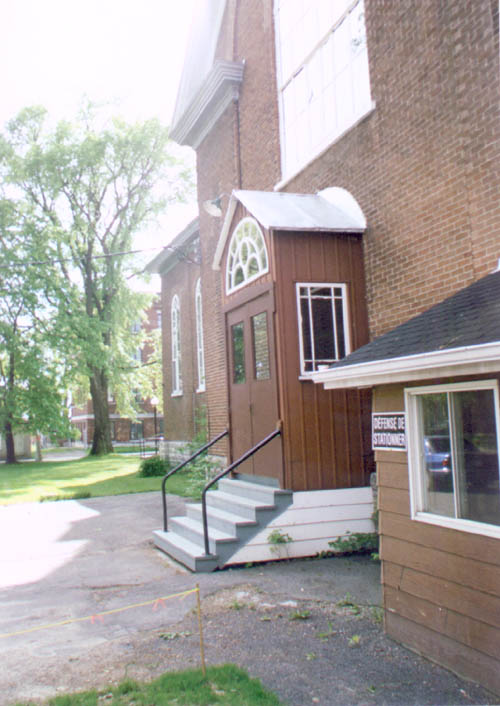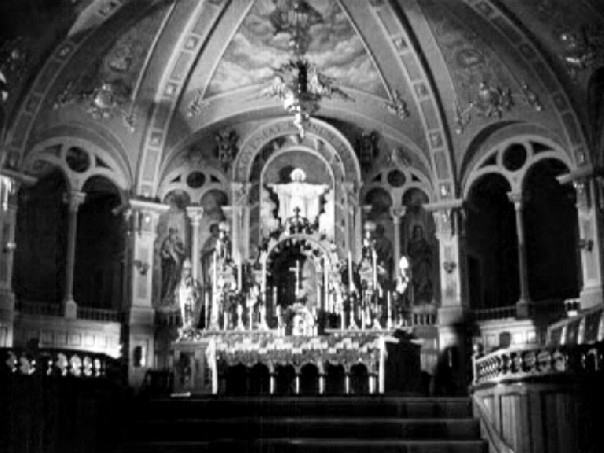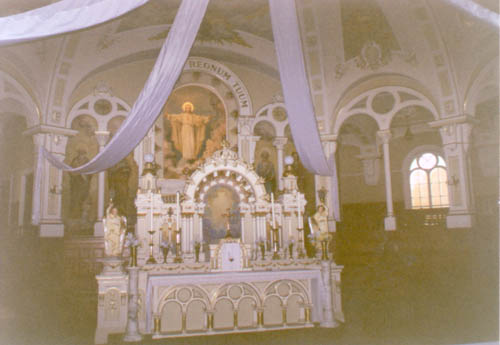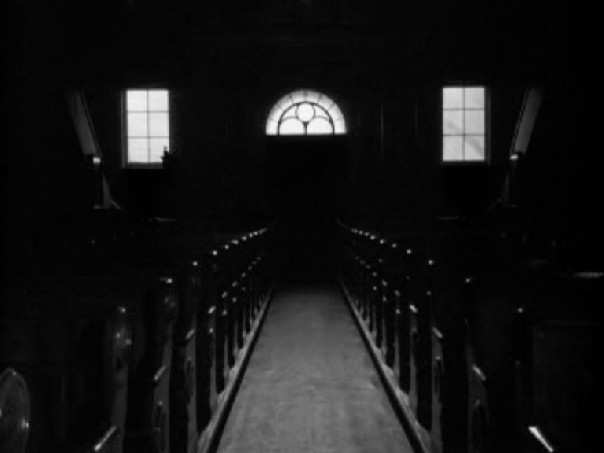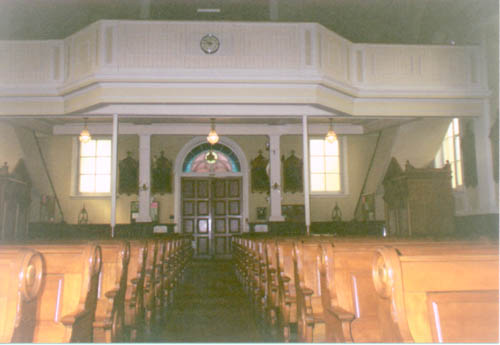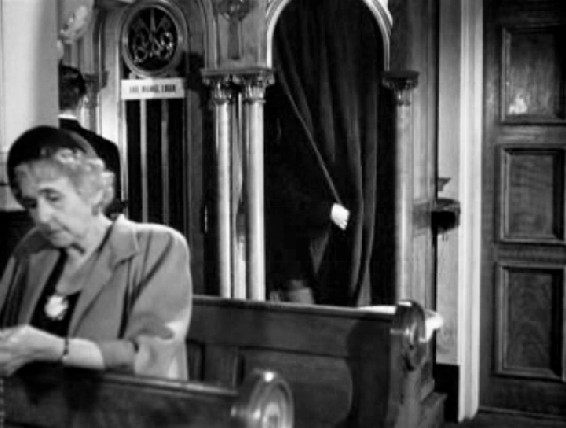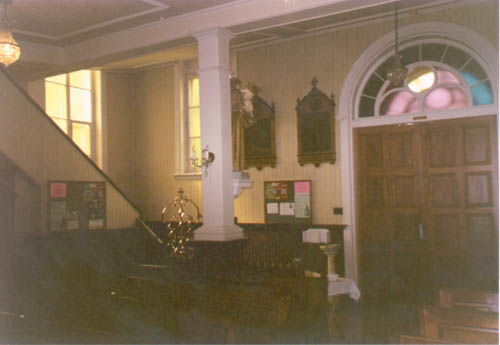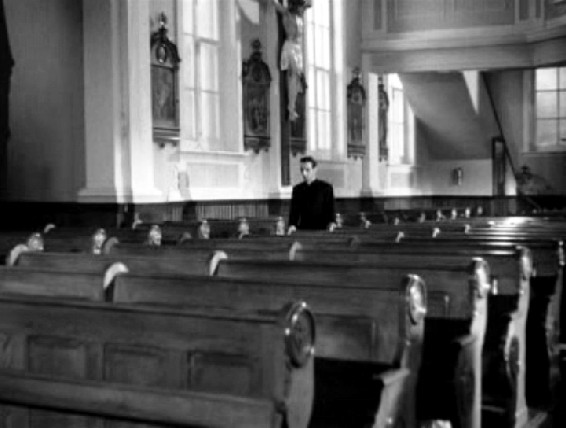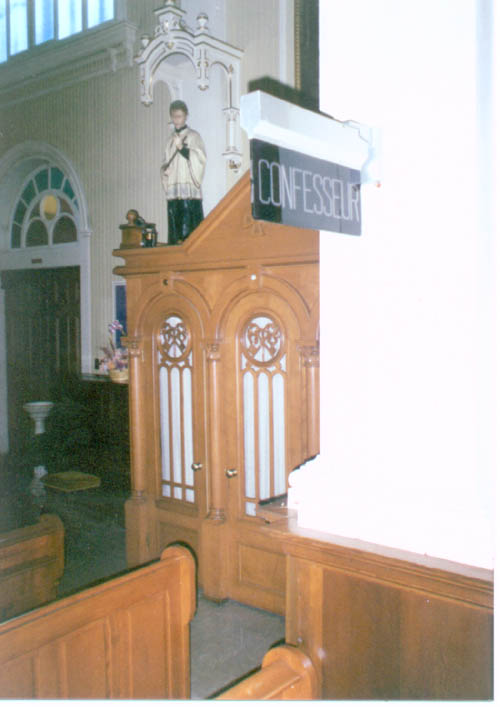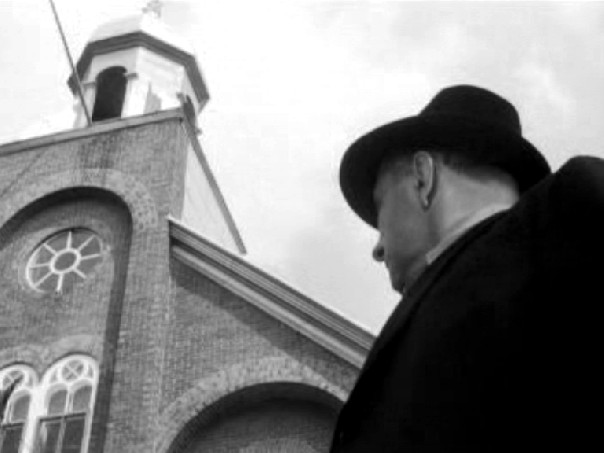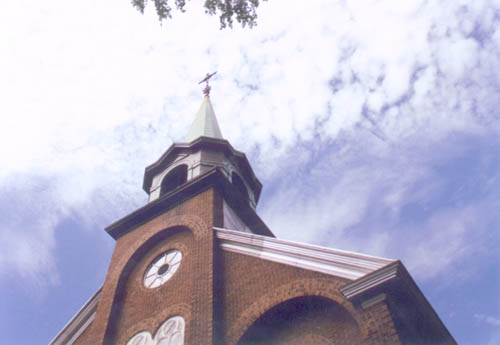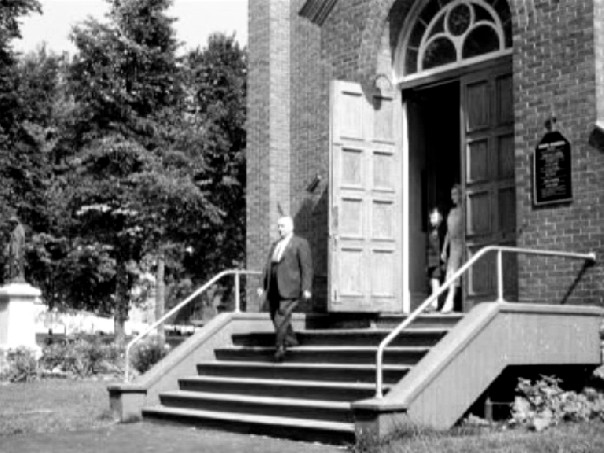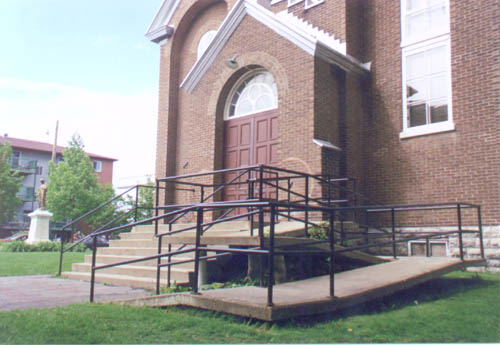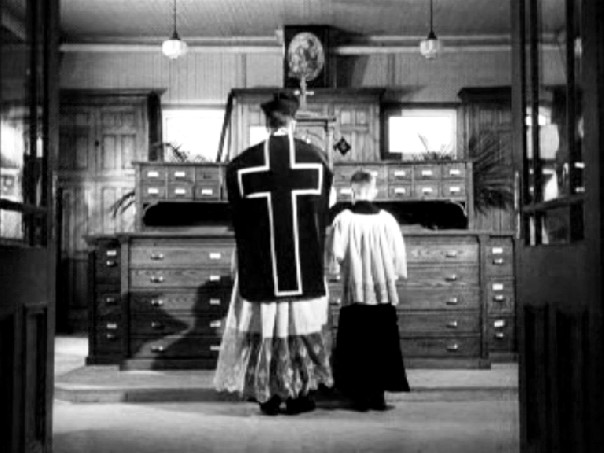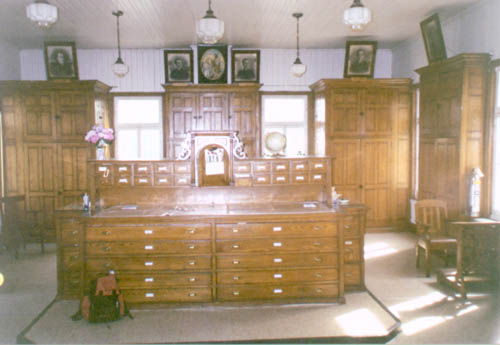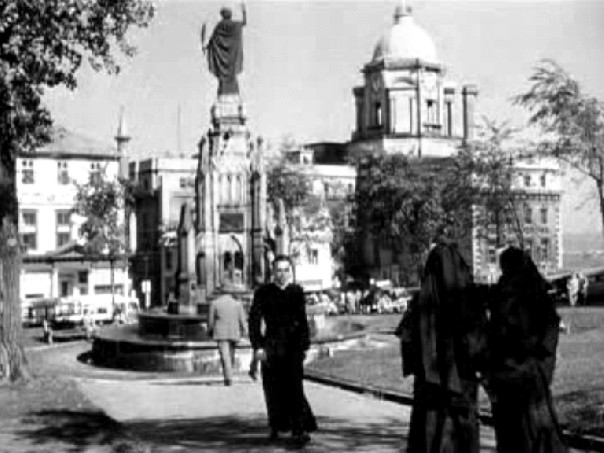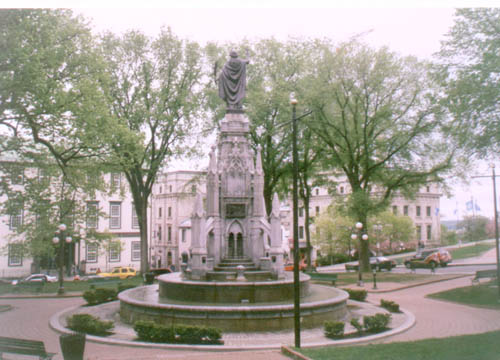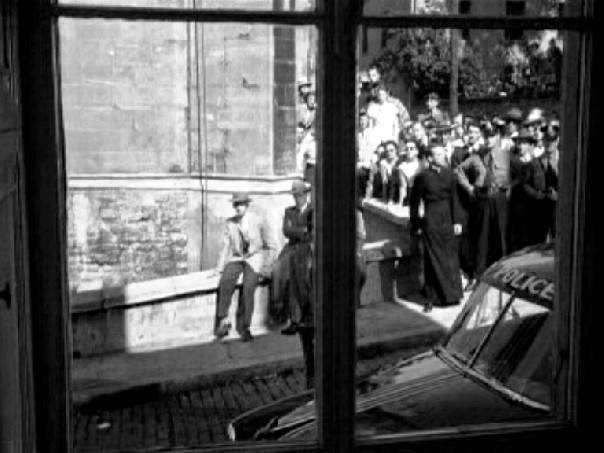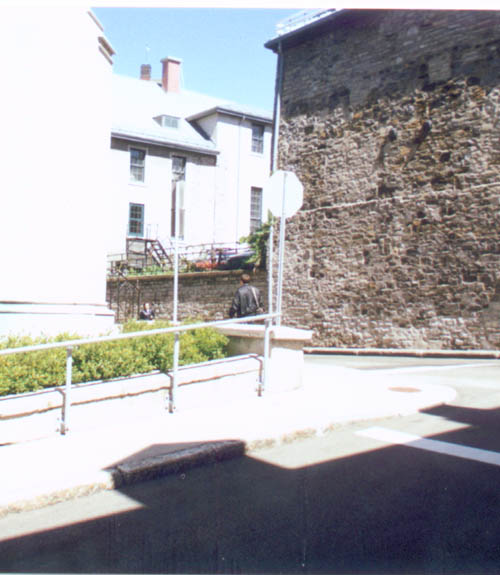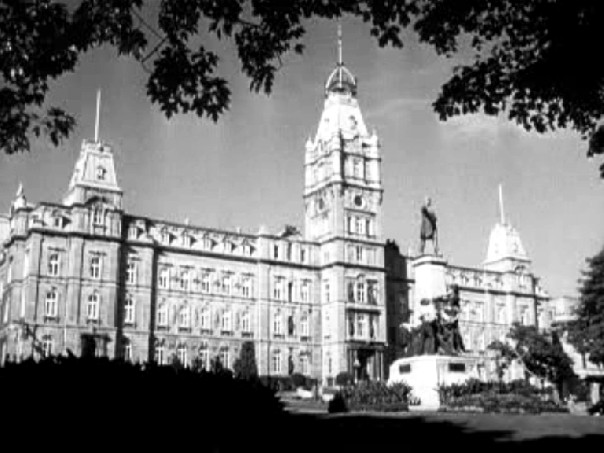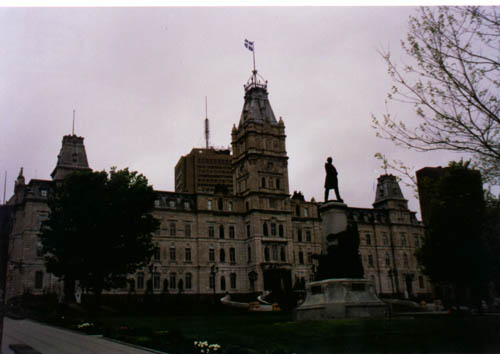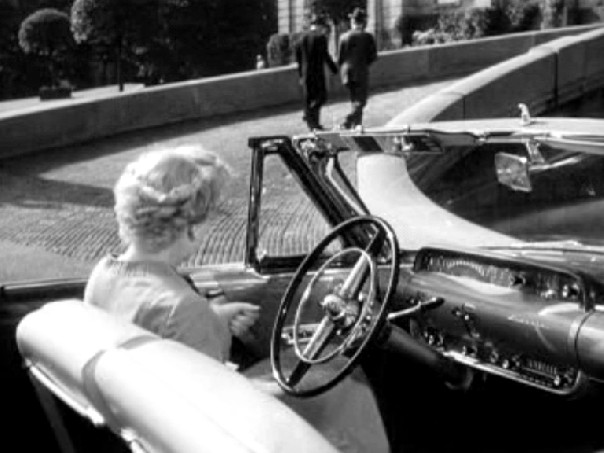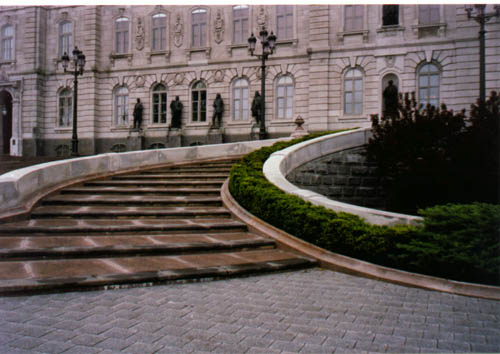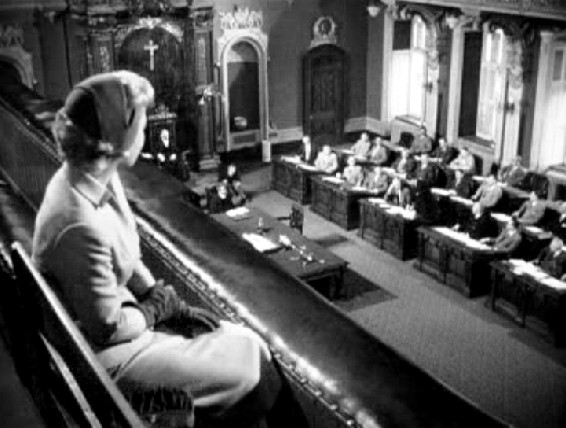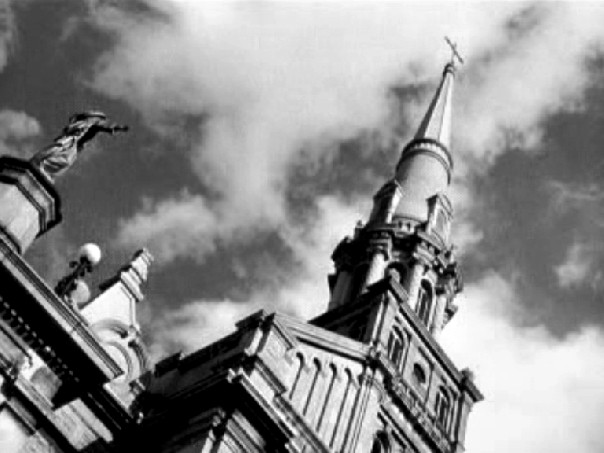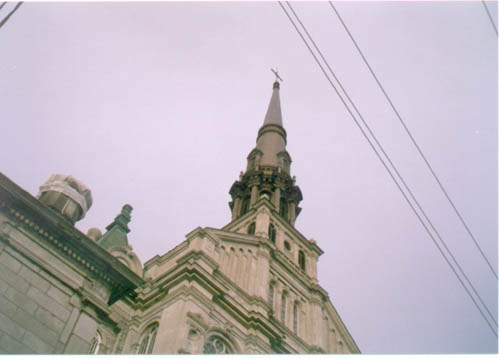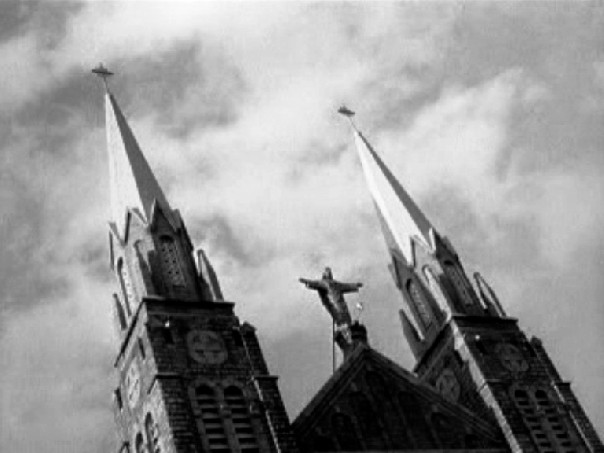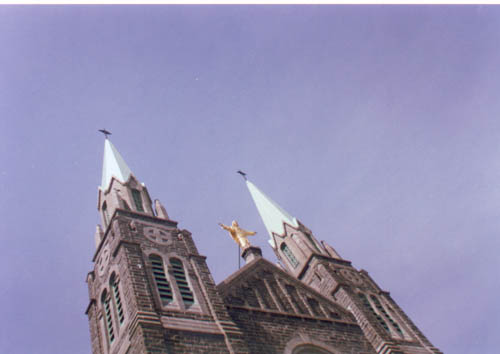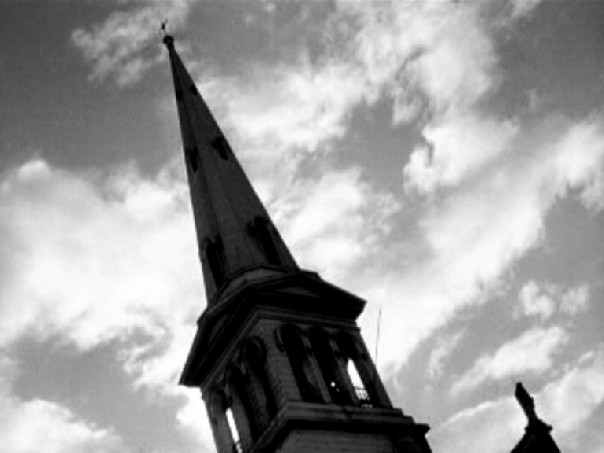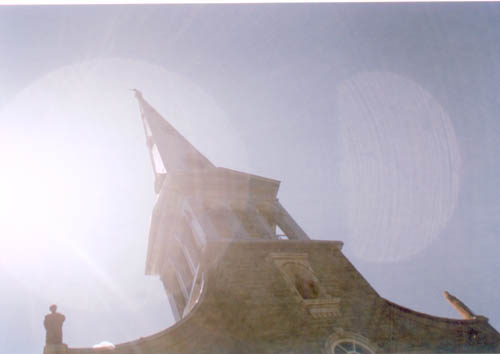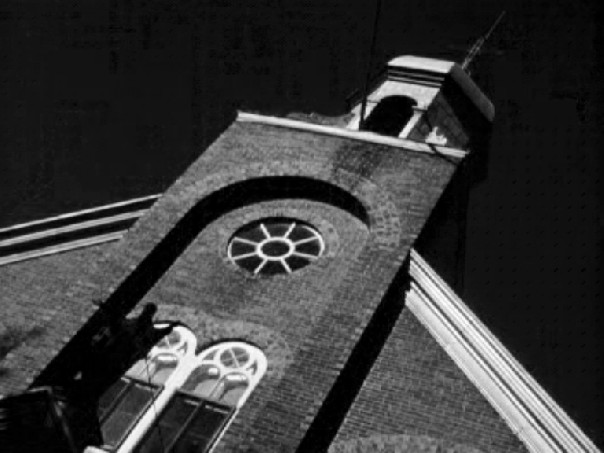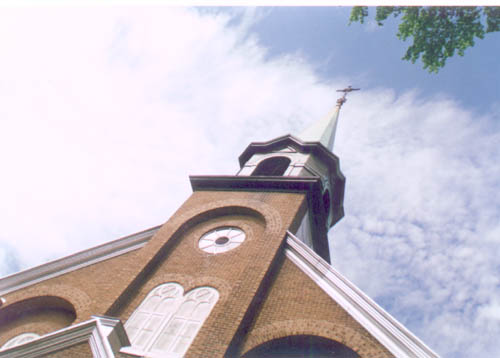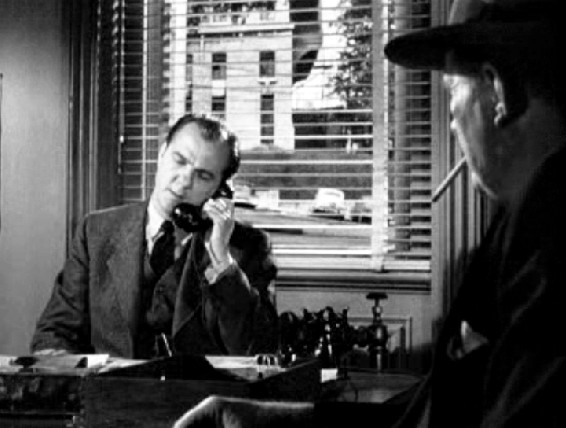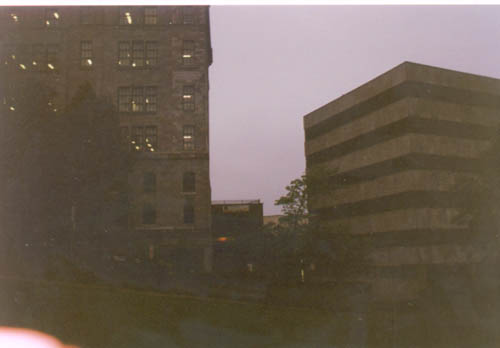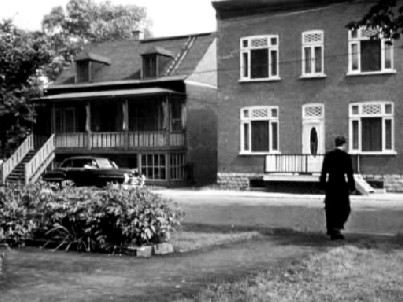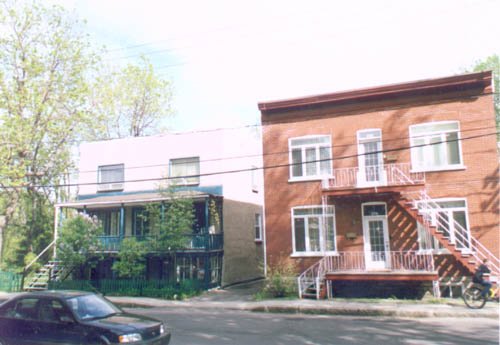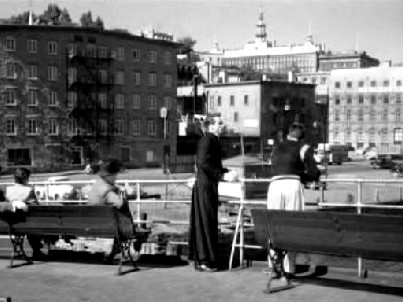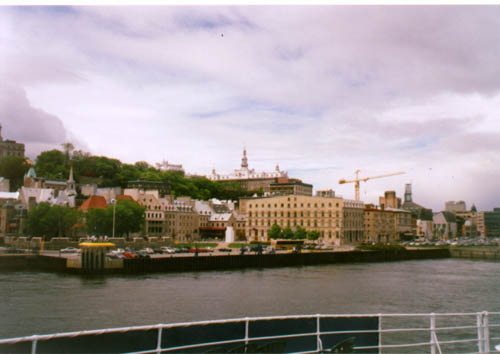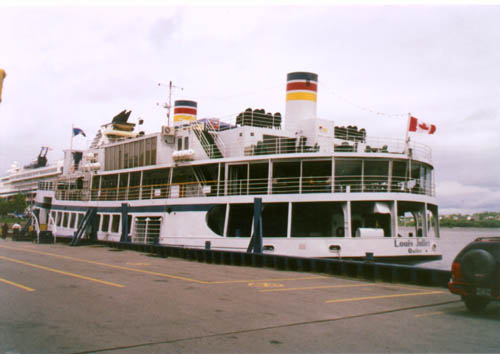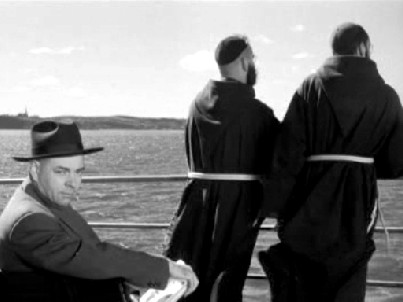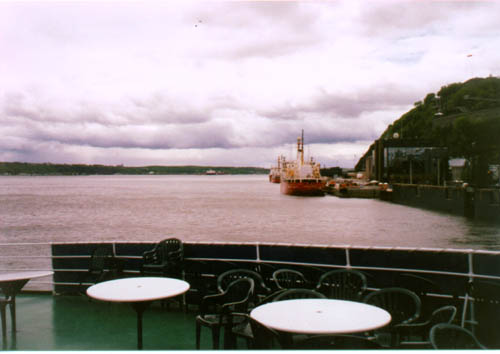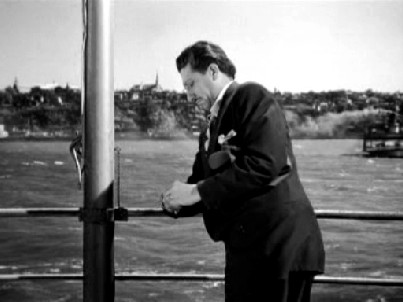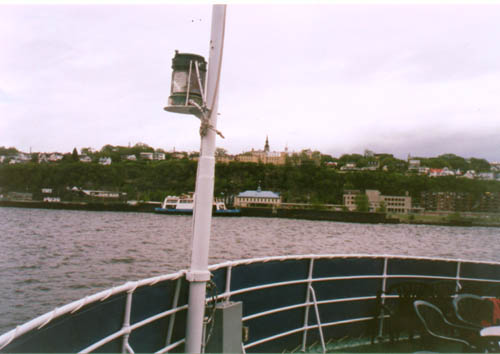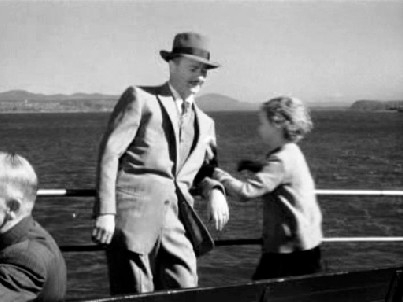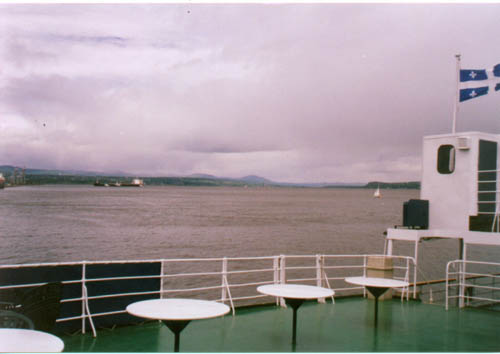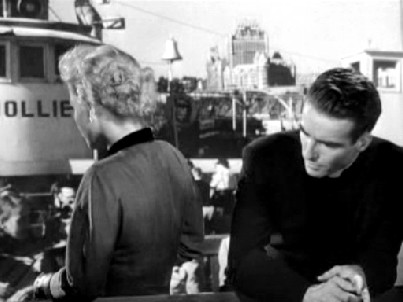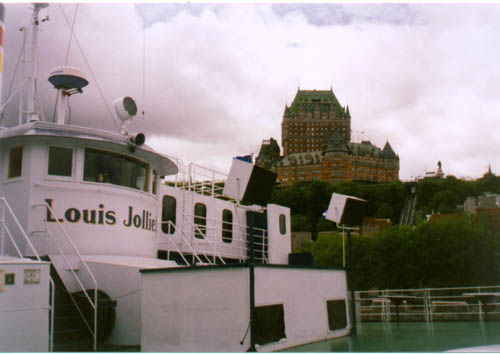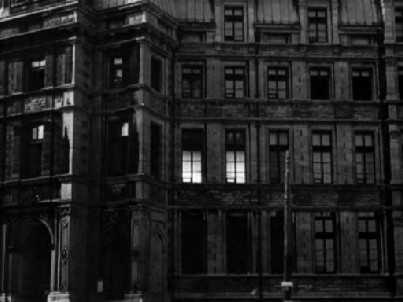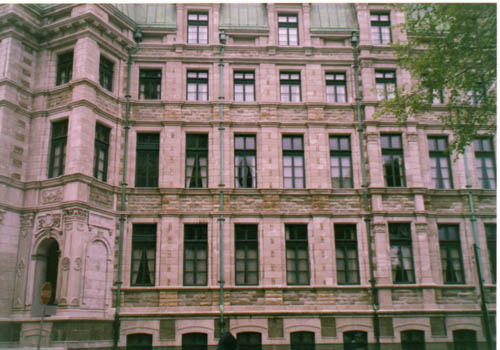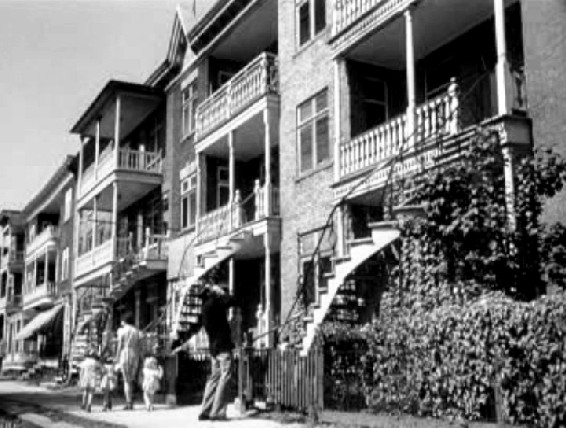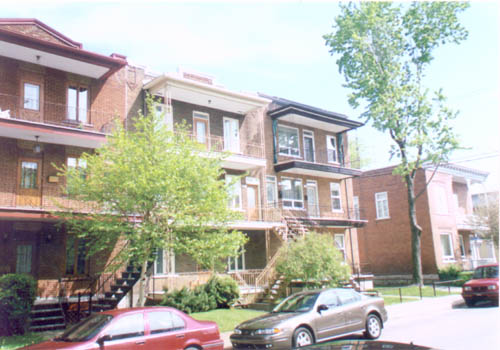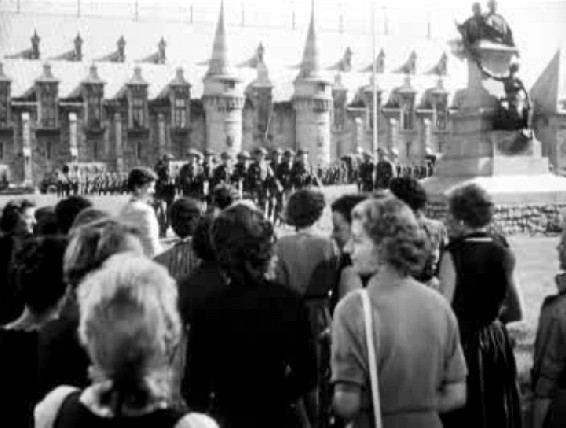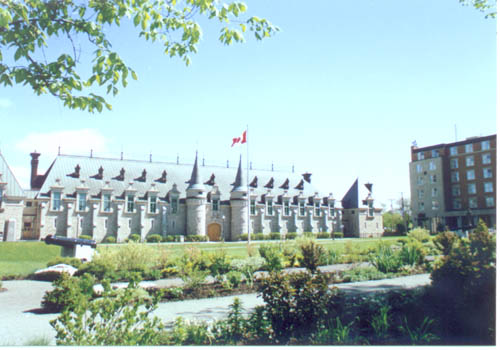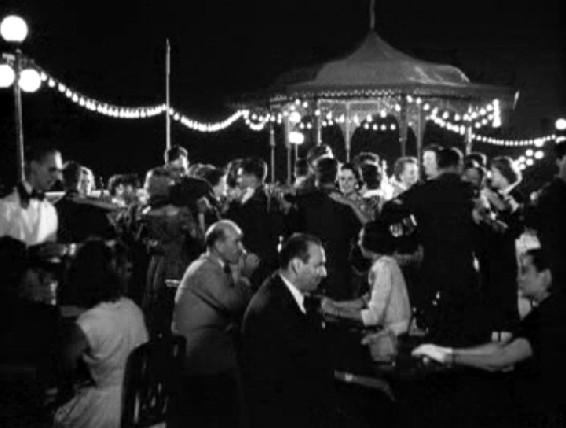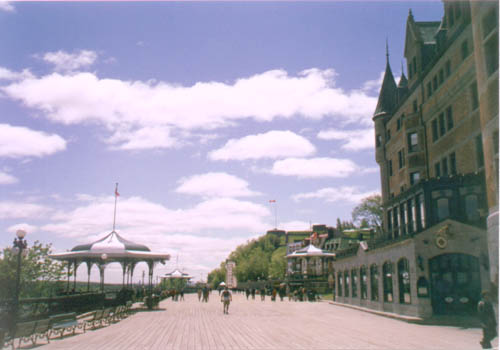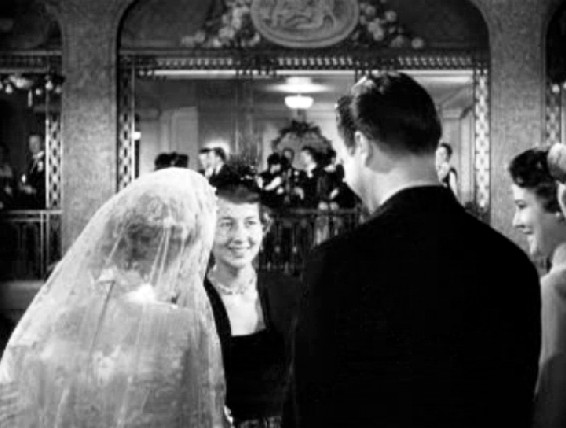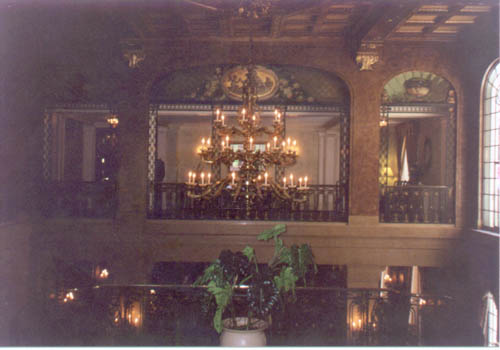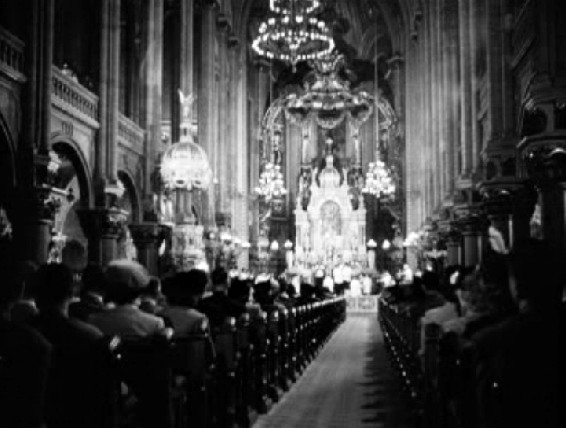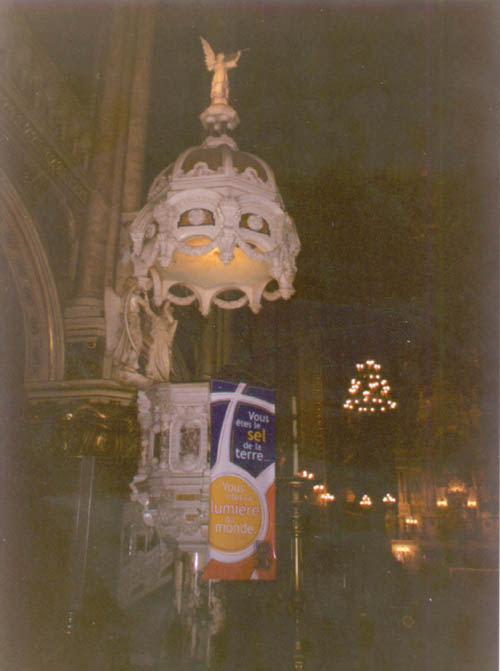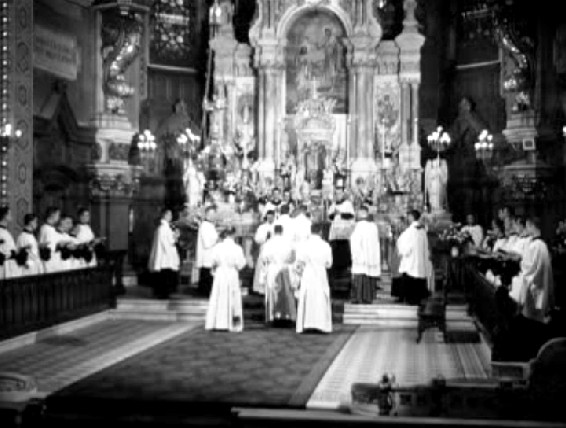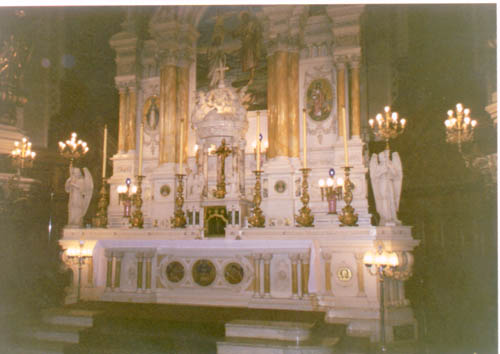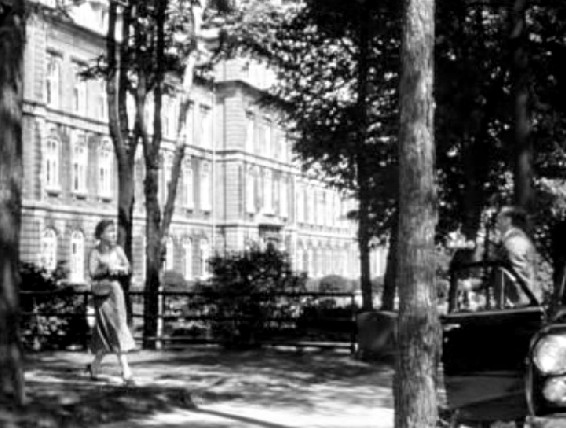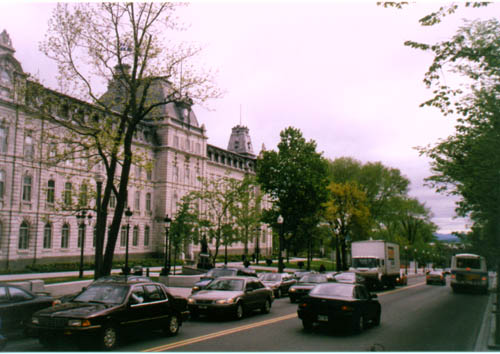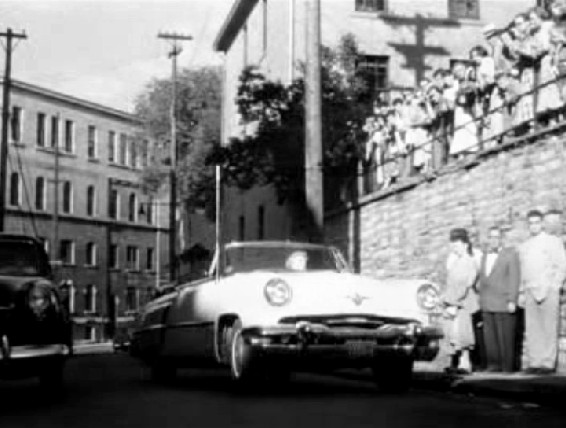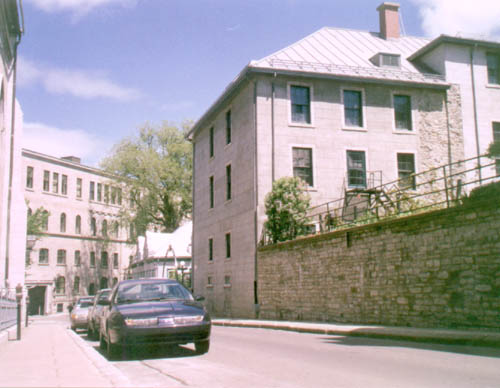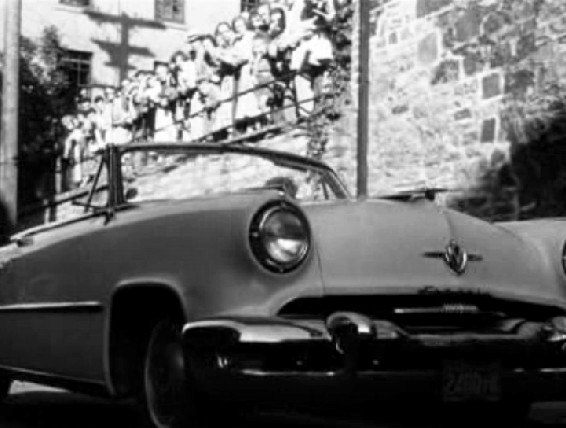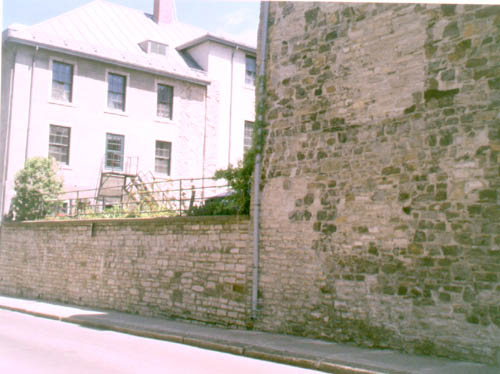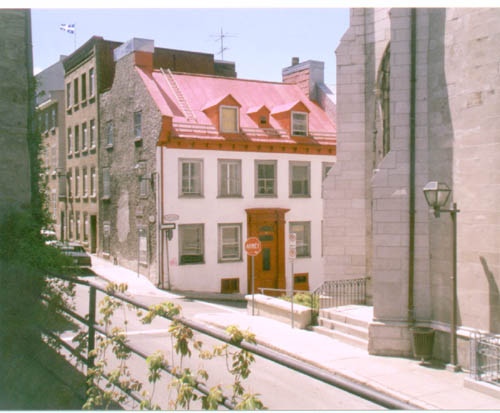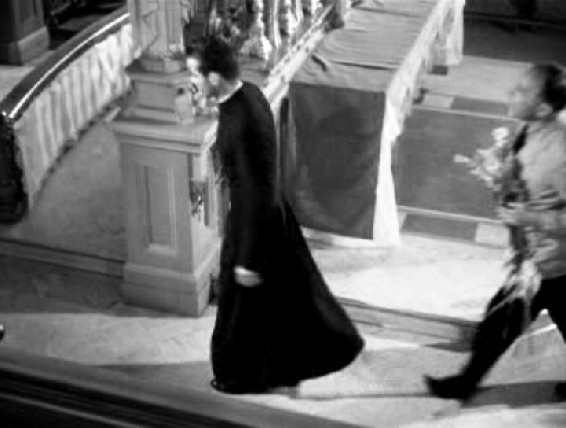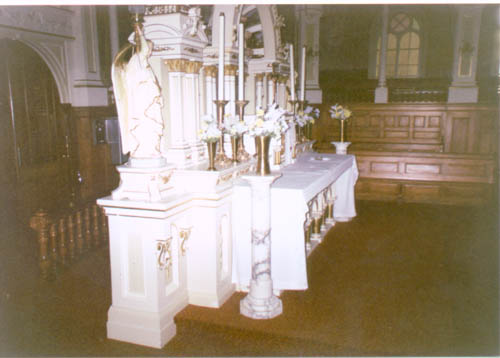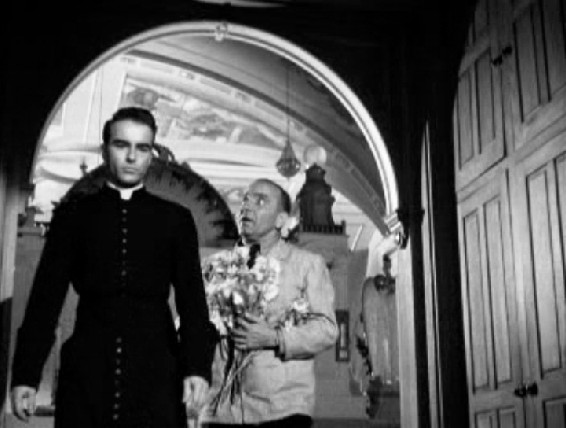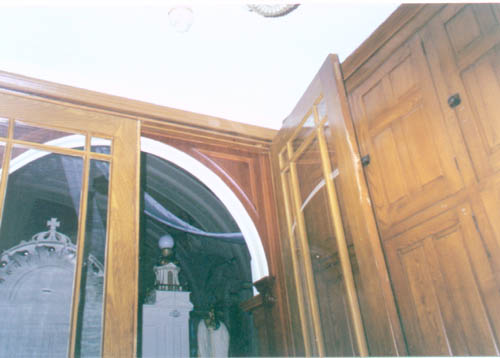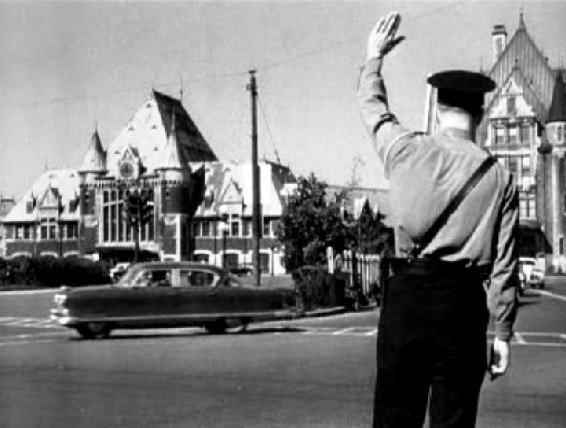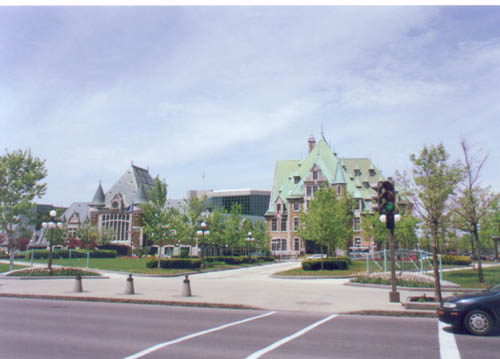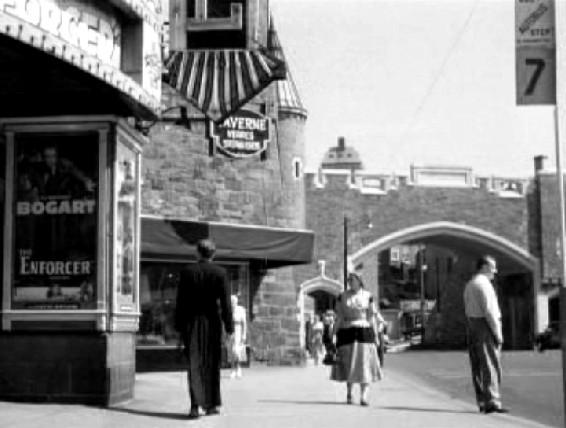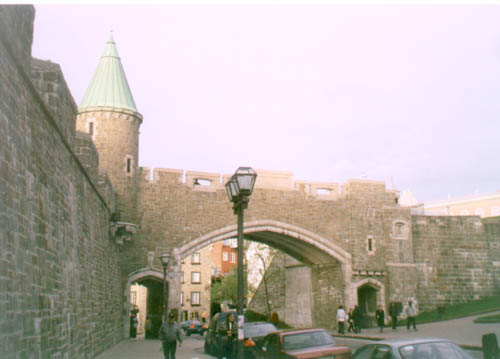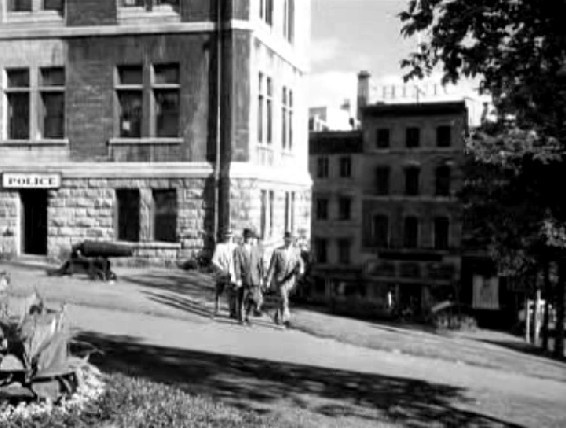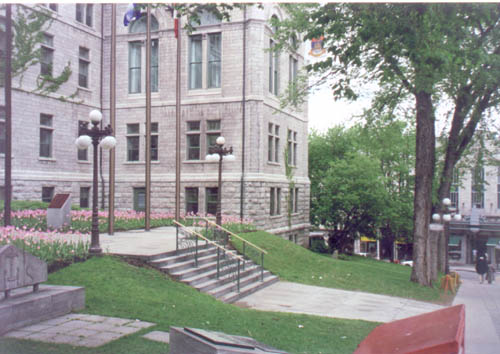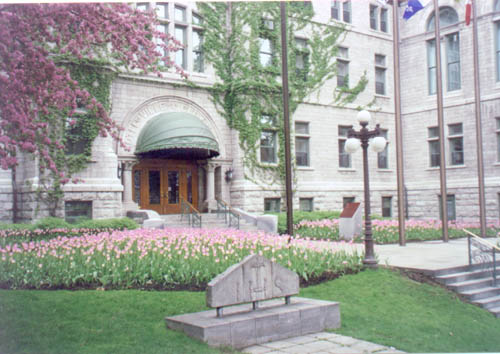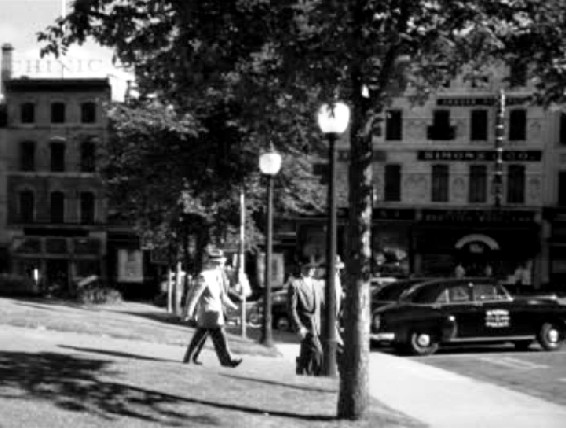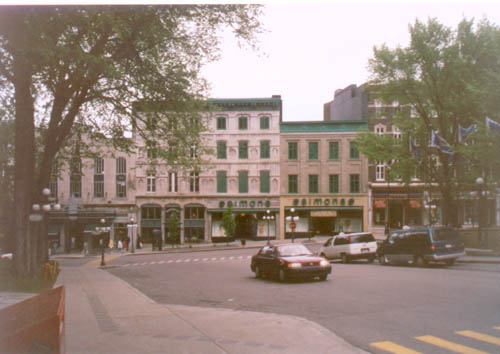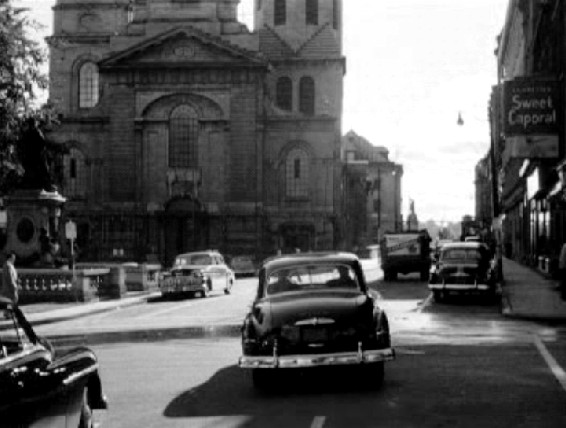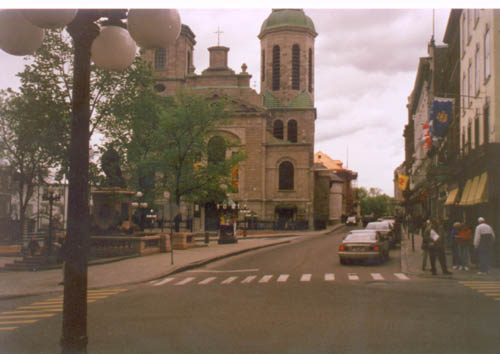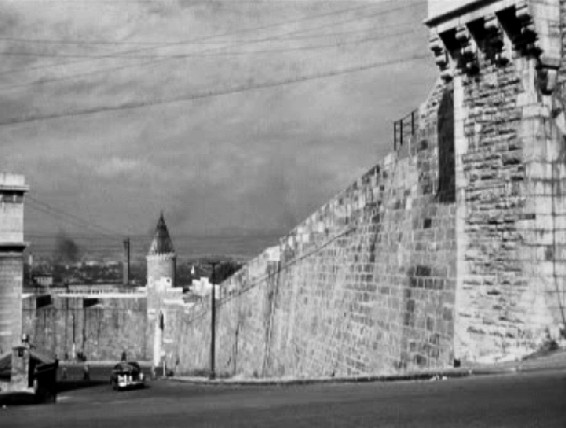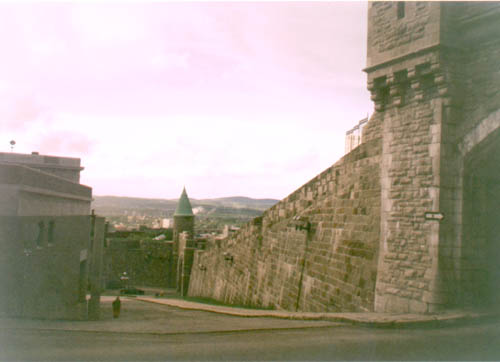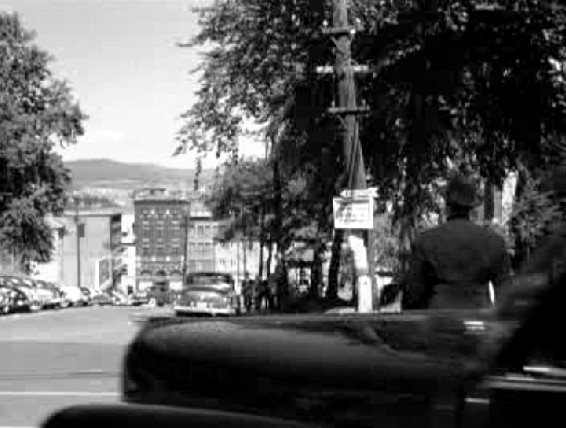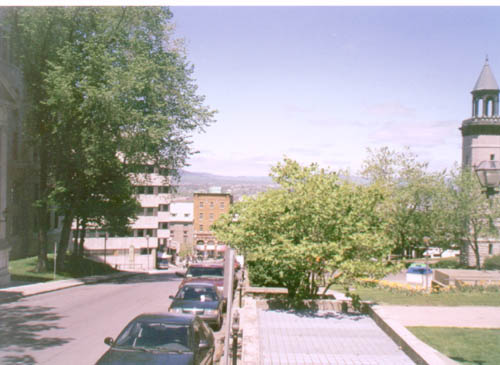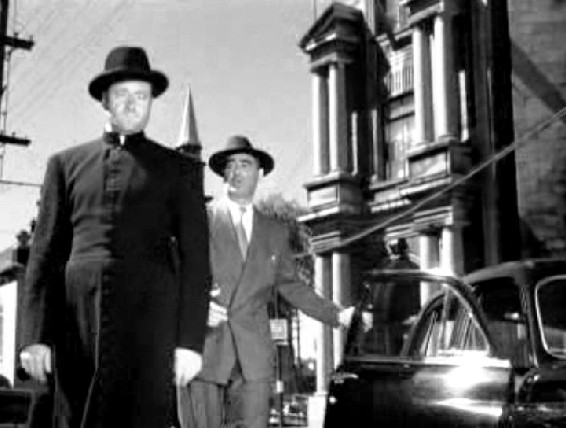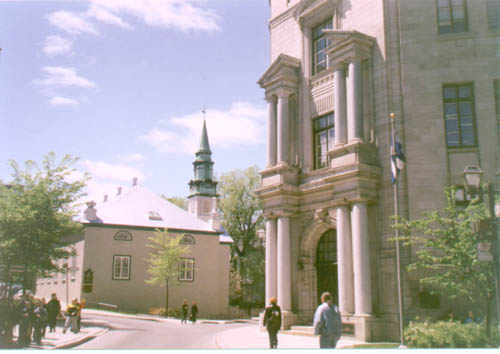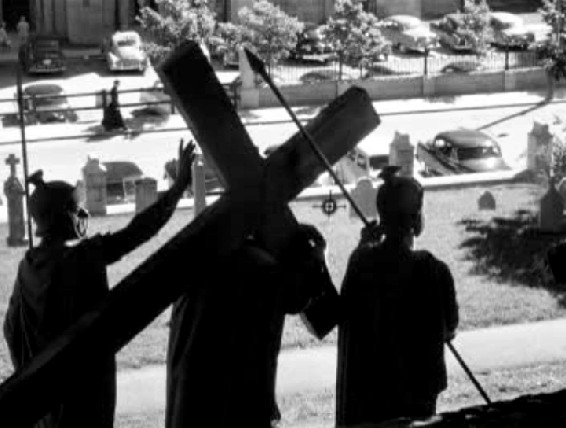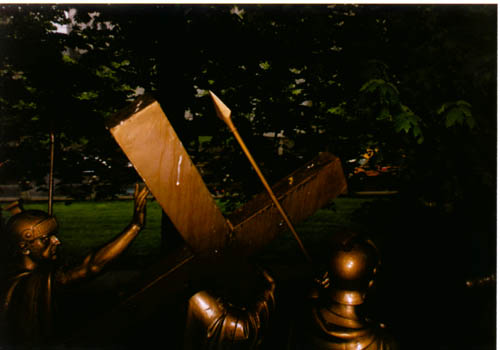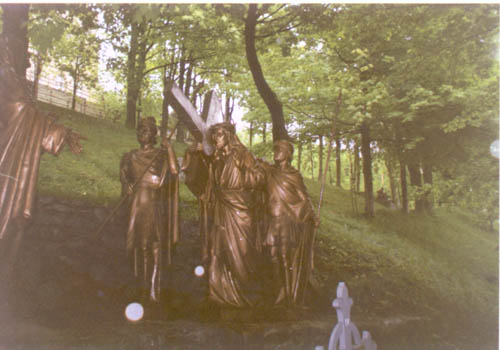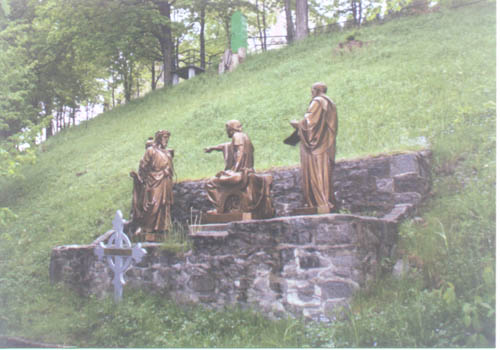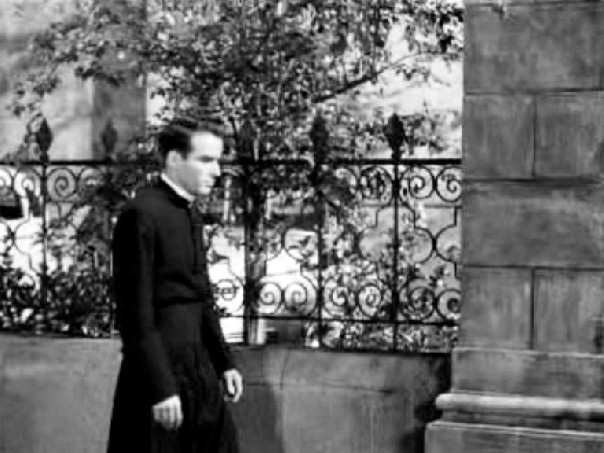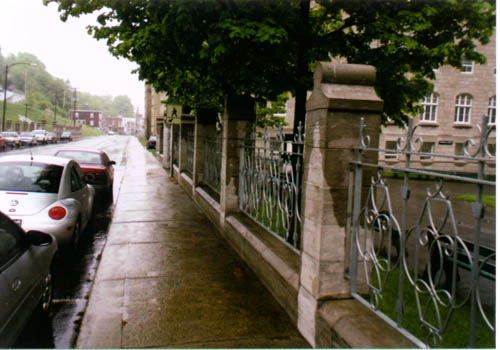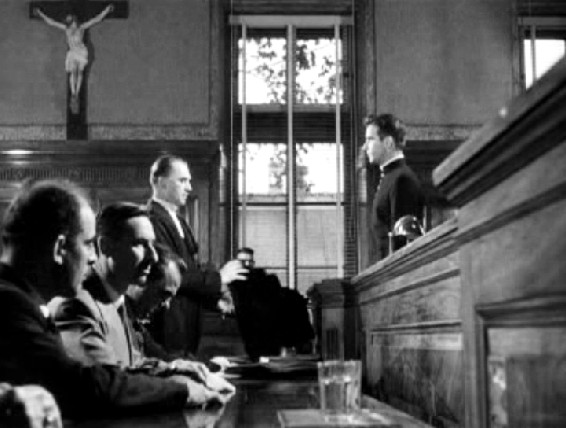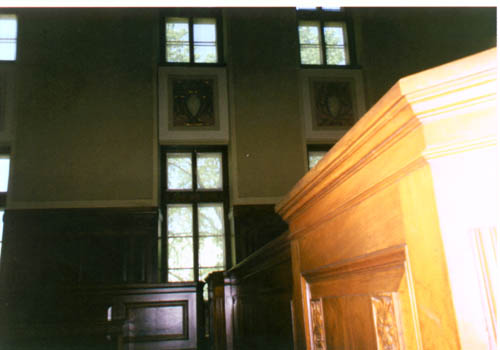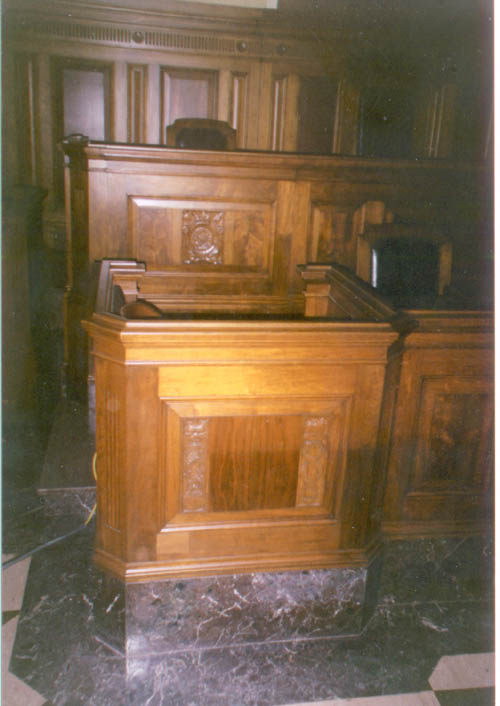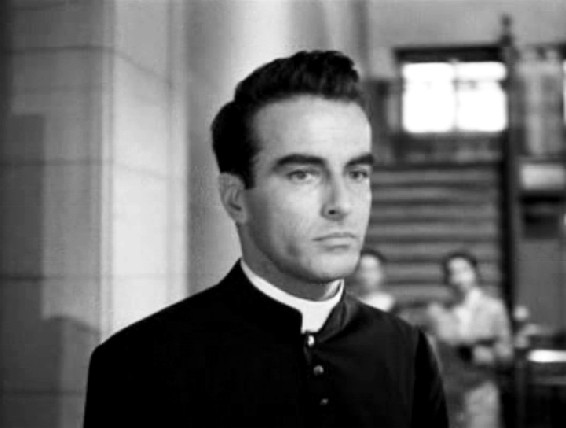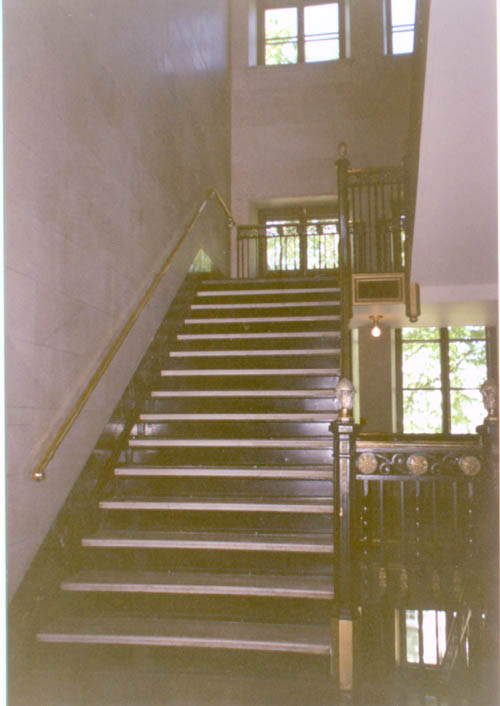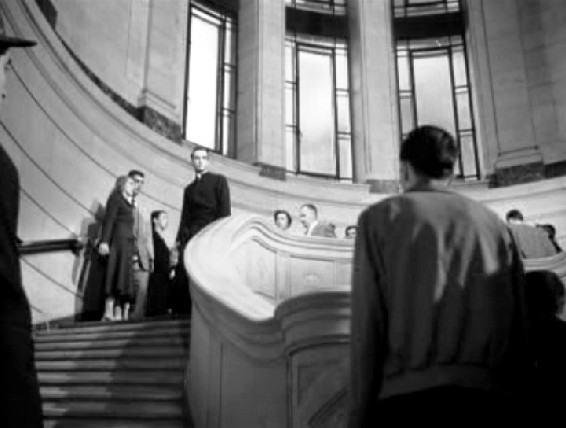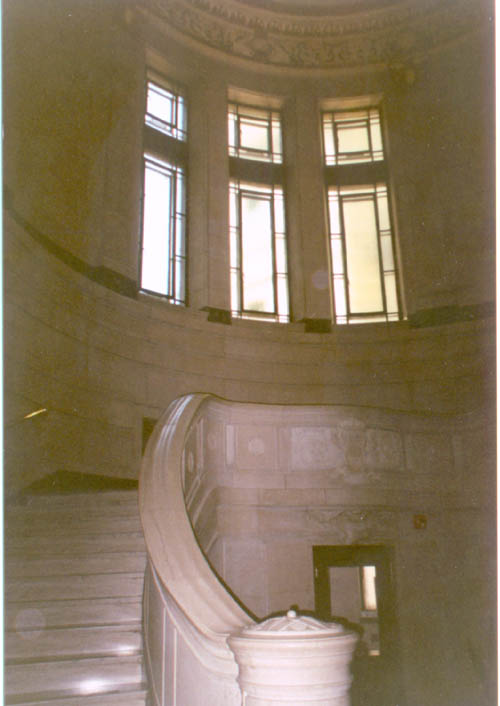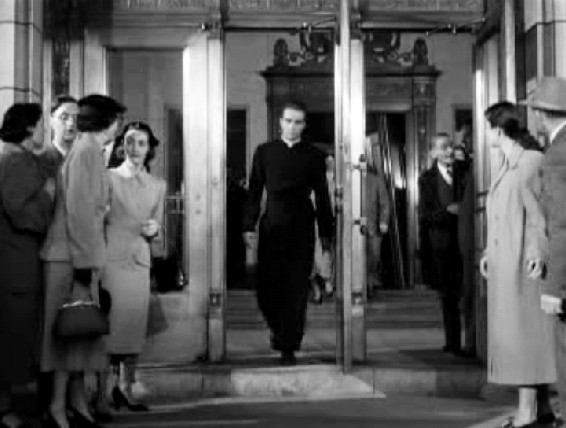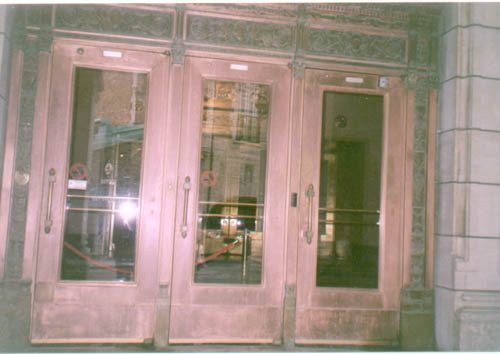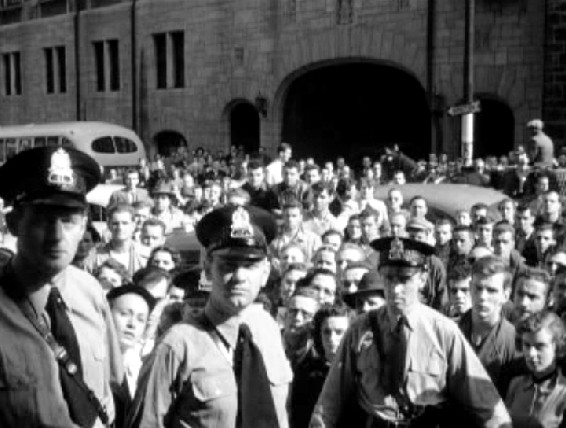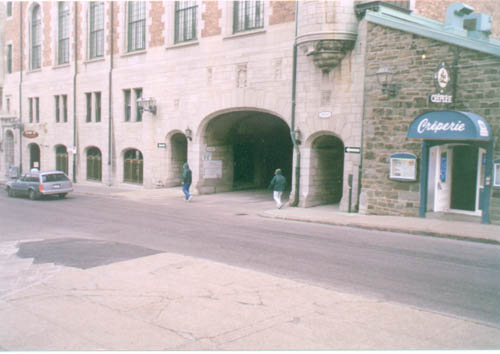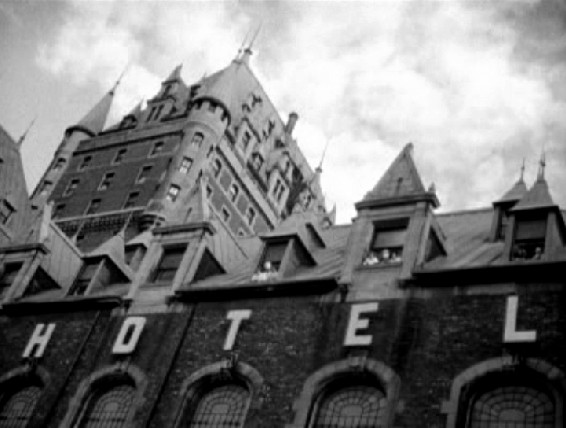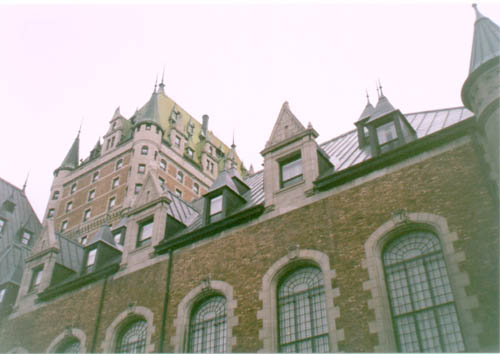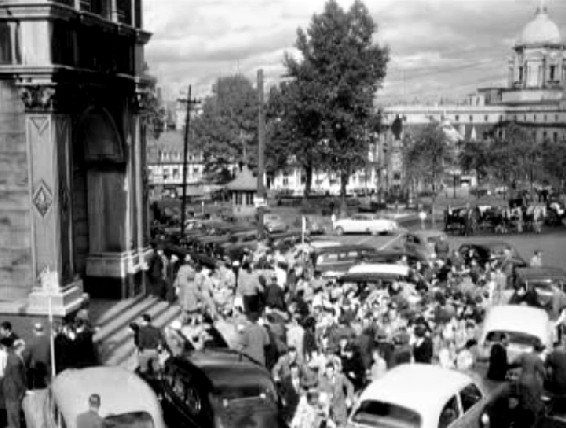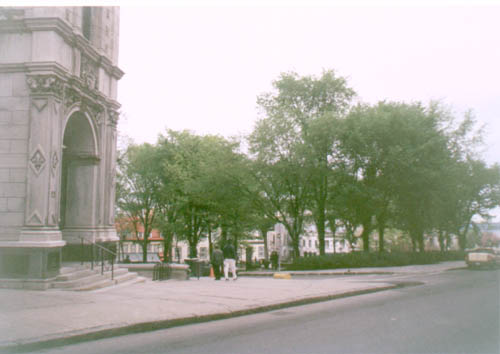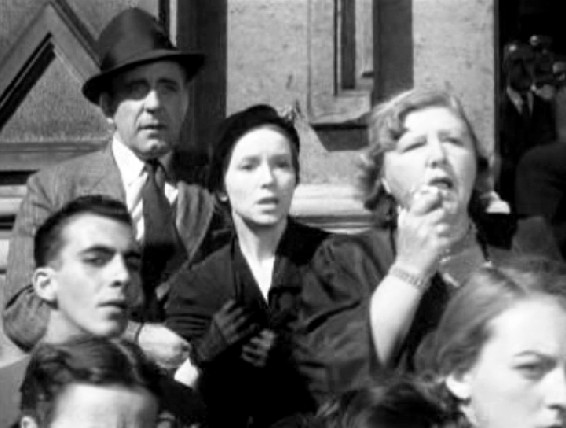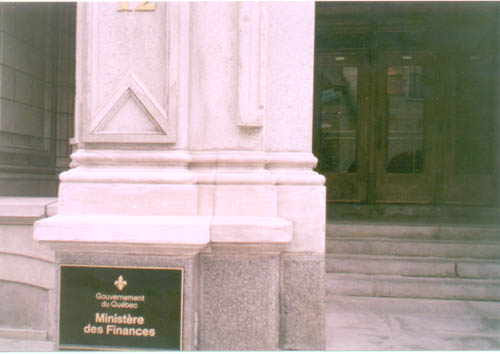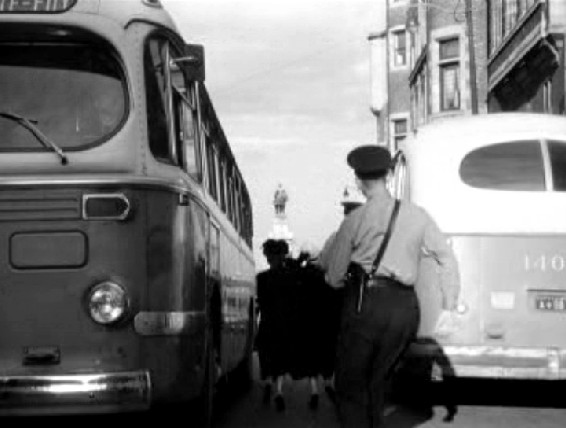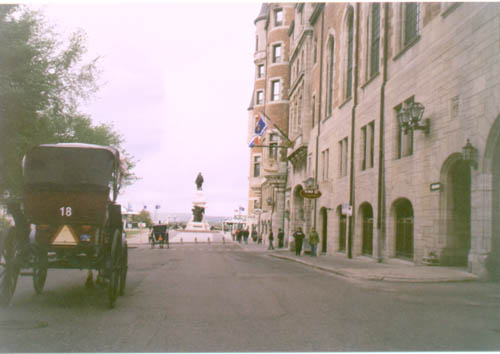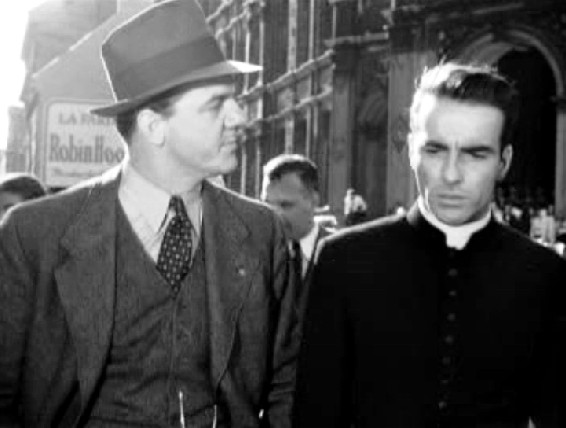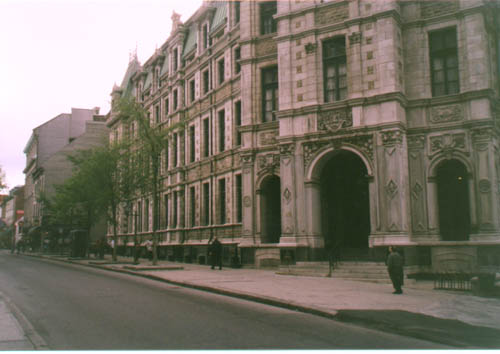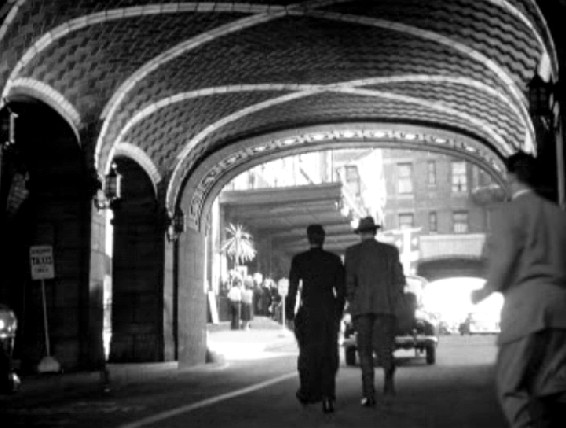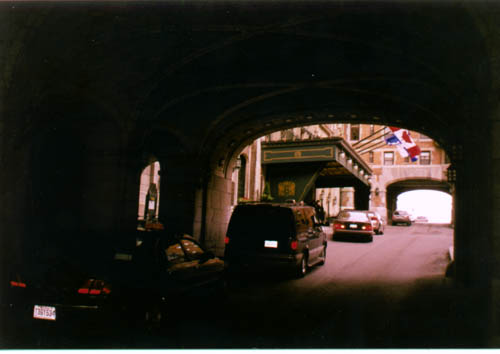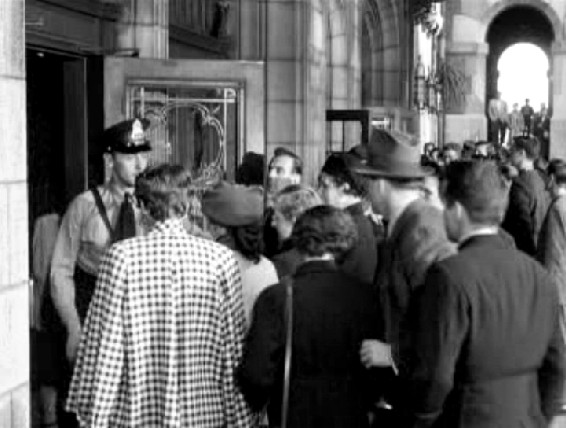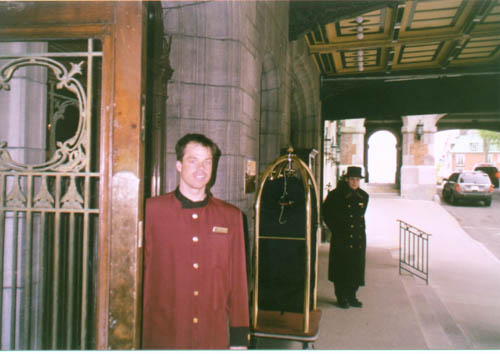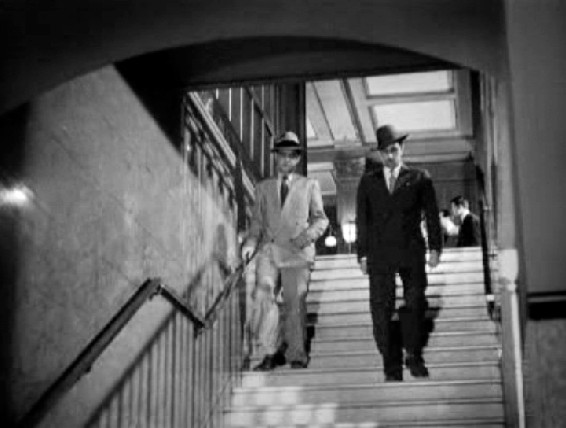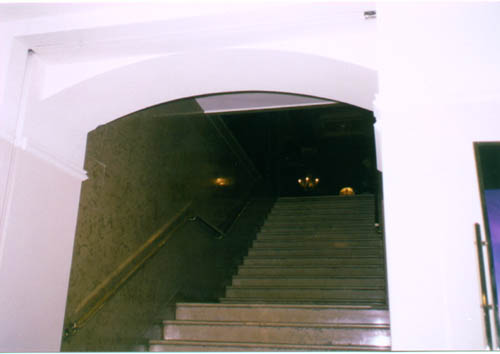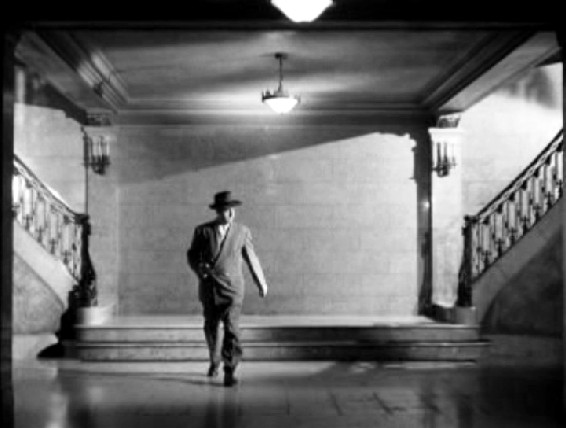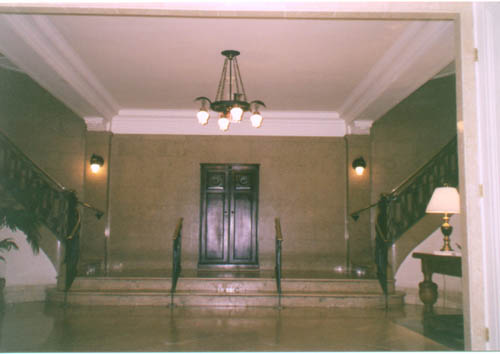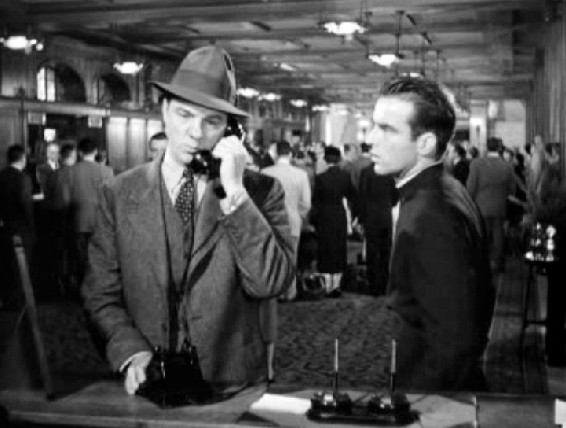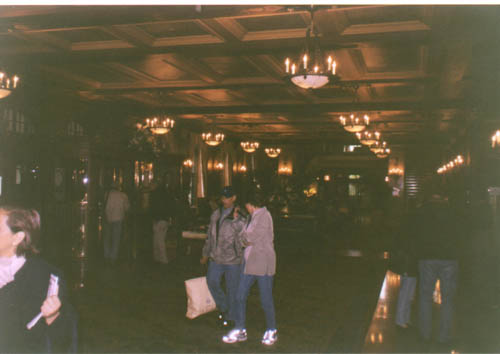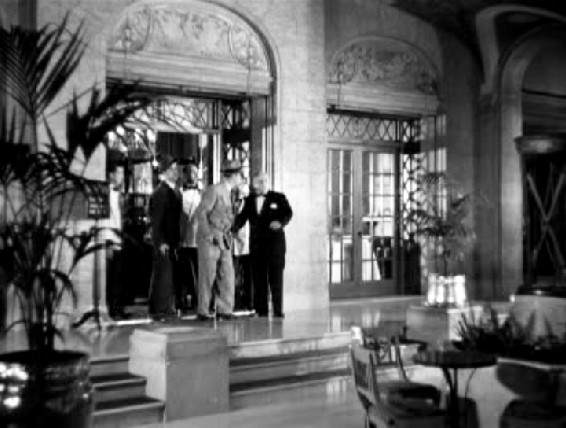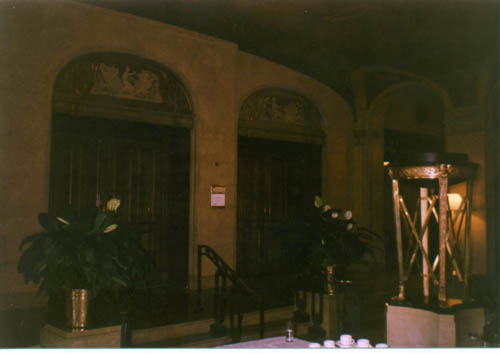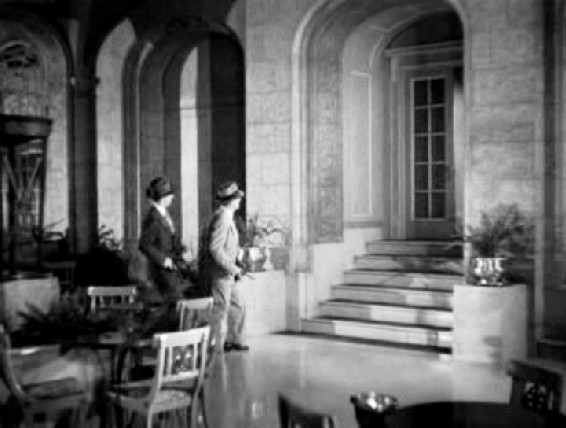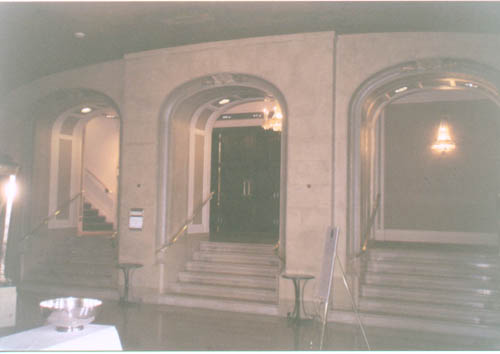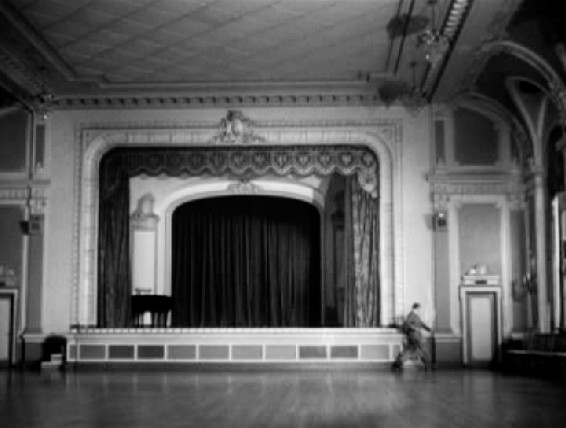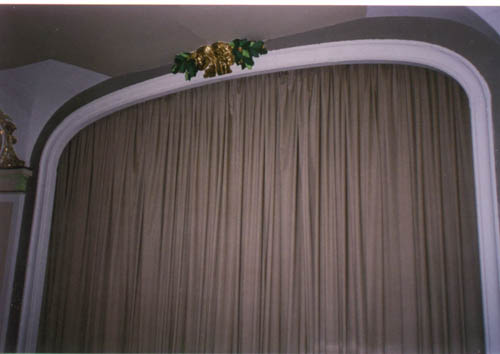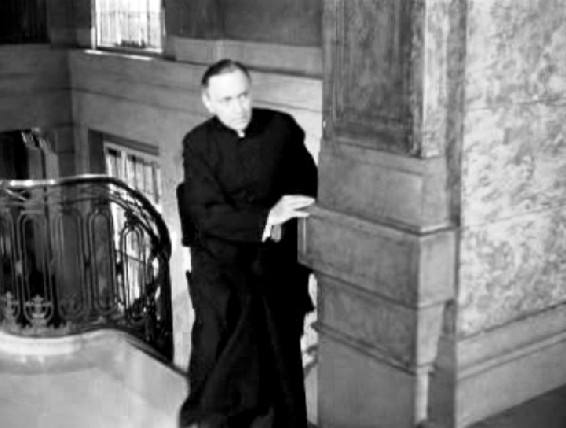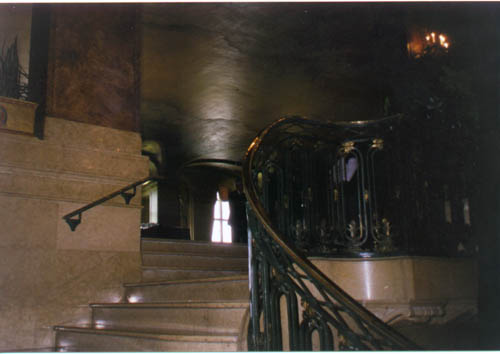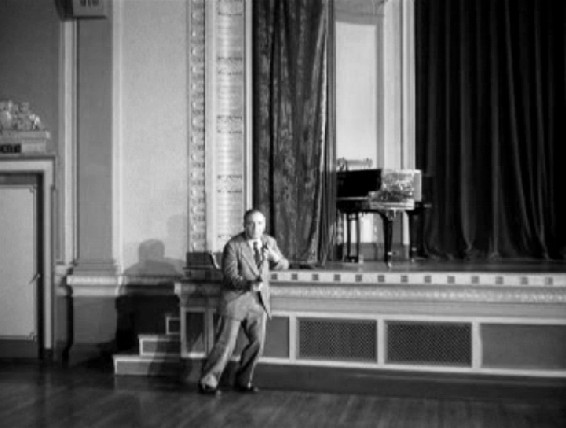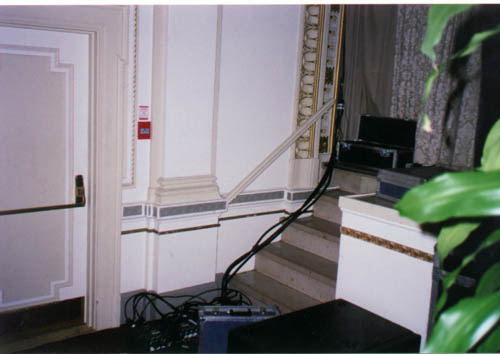The B&W pictures are frames from Hitchcock's "I Confess" (1953). In color are my corresponding photos from 2002. Note that the order of the frames do not follow their order in the film.
Québec
A general view of Québec’s old city from the St Lawrence River, with Château Frontenac dominating the view:
Château Frontenac (which is a top-level hotel), and the statue of Samuel de Champlain, founder of Québec City. Since there is usually a very strong wind here, it must not have been difficult for Hitch to achieve that beautiful shot of the clouds rushing by ominously. (Sudden thunderstorms are also quite frequent around here, so the storm in the flashback scene is completely justifiable.)
L’Escalier Casse-Cou, the location of Hitch’s cameo in the film. Of all of Québec’s many staircases, this is the most famous one, but as you can see, it looks different from the one in the film. I found it by looking at a book that contained old photos of Québec city and by talking to elderly people. The staircase was completely rebuilt a few decades ago. (On my second photo you can see the entrance to the staircase [to the left]. This photo shows the approximate view that Hitch saw as he was walking across the screen at the beginning of the film.)
The old city, near rue St Pierre (many buildings have been rebuilt here):
Porte Kent:
Possibly the corner of rue Notre Dame and rue Cul de Sac (although it’s difficult to identify, because of all the changes that have taken place in the old city since the filming).
The basilica of Notre-Dame de Québec:
Rue Couillard:
Rue Ste Angèle. In the foreground is Vilette’s house (his address is 40 rue Ste Angèle):
Vilette’s house and the corner of l’Institut Canadien (it houses a public library – that’s where I found out where Father’s Logan’s church is in Limoilou).
Rue Christie. It is quite a few blocks away from Vilette’s house (on my second photo: a closer view of the house at the end of rue Christie).
Limoilou (a lovely suburb of Québec City), around St Zéphirin’s church. The building in the background is not the residence of the priest anymore. There are private apartments in it. The front staircase is no longer there. (On my second photo: a closer view of the statue of the Virgin Mary. Also shown is the side entrance to the church. On the 3rd photo: the building with the missing staircase.)
The side entrance to the church. I couldn’t match Father Logan’s
viewpoint of Keller here, because of the lack of the stairs.
The main altar.
The back of the church, with the main entrance.
The main entrance of the church, and the location where the confessional was in the film. Now there is one a little to the left (just not shown on my photo).
The church interior. Just around the corner on the right side of Father Logan in the picture, there is now another confessional (shown on my photo, along with the side entrance).
The church tower was reshaped in the late 50’s.
The main entrance, now facilitated for the disabled.
Behind the main altar, the sacristy looks practically the same as in the film.
The Place d’Armes, with the Monument de la Foi (just opposite Château Frontenac).
A view of l’Institut Canadien, from Vilette’s house.
The Parliament Building (where Pierre worked in the film).
Leading to the entrance is now a staircase, instead of a smooth slope.
This is exactly how the main hall in the Parliament looks like now (I couldn’t take a good photo here). The seats shown in the background are occupied by members of the opposition party, and the gallery on the opposite side (where Ruth is shown sitting in the picture) are reserved for „guests of the opposition party”. Seats for the governing party and the gallery for their guests are situated in a similar diagonal manner, facing their opposition equivalents.
The Church of St Jean Baptiste on rue St Jean. It was also used as the “Cathedral” in which Father Logan had been ordained.
The Church of St Ignace de Loyola in Giffard (another suburb, a little further away from the city).
The Church of St Romuald, in a little town called St Romuald, on the opposite side of the St Lawrence River.
Another view of St Zéphirin’s church in Limoilou.
This building (shown behind Karl Malden) is behind City Hall. (The present City Hall was used as the Police Station in the film.)
These two lovely houses are near the church in Limoilou.
View of the port from the “Louis Jolliet”, a boat that still takes passengers on cruises on the St Lawrence River (on my second photo: the boat today). Note that several buildings have been demolished since the filming.
View from the boat to the right. (Ruth’s head movement is not matched to reality here, since she’s looking to the left to see this view.)
View from the boat ahead (opposite Québec City).
View from the boat to the left. (Ruth sees it looking to the right.)
The front deck of the boat and Château Frontenac.
The Old Courthouse. This is where the District Attorney’s office was in the film, and Logan’s trial took place here too. Today it’s the Ministère des Finances, and I needed to obtain special permission to go inside and take pictures.
Limoilou, Ruth lived here before her marriage. I couldn’t find the house itself, but there are dozens of similar houses with the characteristic spiral staircases (a typical example is shown on my photo).
A military building, the Voltigeurs de Québec Armory. The monument which can be seen in front of the building in the film still exists, but has been moved to the side of the square, and gave its place to another, more modern war memorial.
One of the several gazebos on the Dufferin Terrace, in front of Château Frontenac (my photo just shows some of them, not necessarily the one shown in the film).
This is inside Château Frontenac on the second floor, just outside the Ballroom. Here it is location of Ruth and Pierre’s wedding, but it is shown briefly in the final scene of the film too. It seems fitting that Ruth and Pierre have their marital reconciliation (at the end of the film) at exactly the same place where they had their wedding ceremony.
The interior of the Church of St Jean Baptiste.
The main altar.
The side of the Parliament. Ruth and Pierre lived in a little house to the left of this building. The row of those elegant little houses has been demolished since.
Rue Dauphine, near Vilette’s house.
Another view of the stone wall (my second photo: view of Vilette’s house and l’Institut Canadien from the top of the stone wall).
The main altar in Father Logan’s church.
The doorway connecting the main altar with the sacristy.
The Gare du Palais (railway and bus station).
Porte St Jean.
City Hall, which was the Police Station in the film. (My second photo: the main entrance. 3rd photo: the door on the left was the entrance to the Police Station in the film.)
The place in front of City Hall.
The basilica of Notre-Dame de Québec.
The wall between Porte St Jean and Porte Kent.
A square behind City Hall.
St Andrew’s Presbyterian Church and the Édifice Jean Baptiste de la Salle. (Note that the tree seen between the two buildings in the background is the same tree that can be seen in the background of the pictures entitled "Rue Dauphine, near Vilette’s house", above)
Ste Anne de Beaupré, an important pilgrimage site in Québec, about 20-25km from Québec City. Here you can see the stations of the cross – made up of life-size statues – of which the 4th station (“Jesus meets his mother”) is shown in the film. (It was raining when I was there, that’s why my photos are so dark.) (On my second photo: the 4th station. 3rd photo: the 1st station, “Jesus is condemned to death”.)
The sidewalk (possibly a studio shot or filmed at another location, since it doesn't match the one at Ste Anne de Beaupré now), where Father Logan is supposed to have walked, before entering the “cathedral”, about 20km from here...
The courtroom inside what is now the Ministère des Finances. The cross is not there anymore. (Second photo: the stand where Logan and the witnesses were questioned during the trial.)
A staircase just outside the courtroom.
The main staircase in the building.
The entrance.
The view of Château Frontenac from the entrance of the “courthouse”.
The same façade, only the “Hotel” sign is missing.
The entrance of the “courthouse” and Place d’Armes in the background.
Château Frontenac with the statue of Samuel de Champlain in the background.
Another view of the “courthouse”.
The car entrance to Château Frontenac.
The main entrance to the lobby.
The stairs on which the detectives run down in search for Keller.
The basement and two spiral staircases.
The main lobby.
The Salon Verchères on the second floor of the hotel, just outside the Ballroom.
The Ballroom’s entrance. (during the camera movement in the film between this frame and the previous one, you can spot the location of Ruth and Pierre's wedding (see above)).
The Ballroom.
The staircase leading up to the Salon Verchères (my photo is from the reverse angle).
The place where Keller died.
